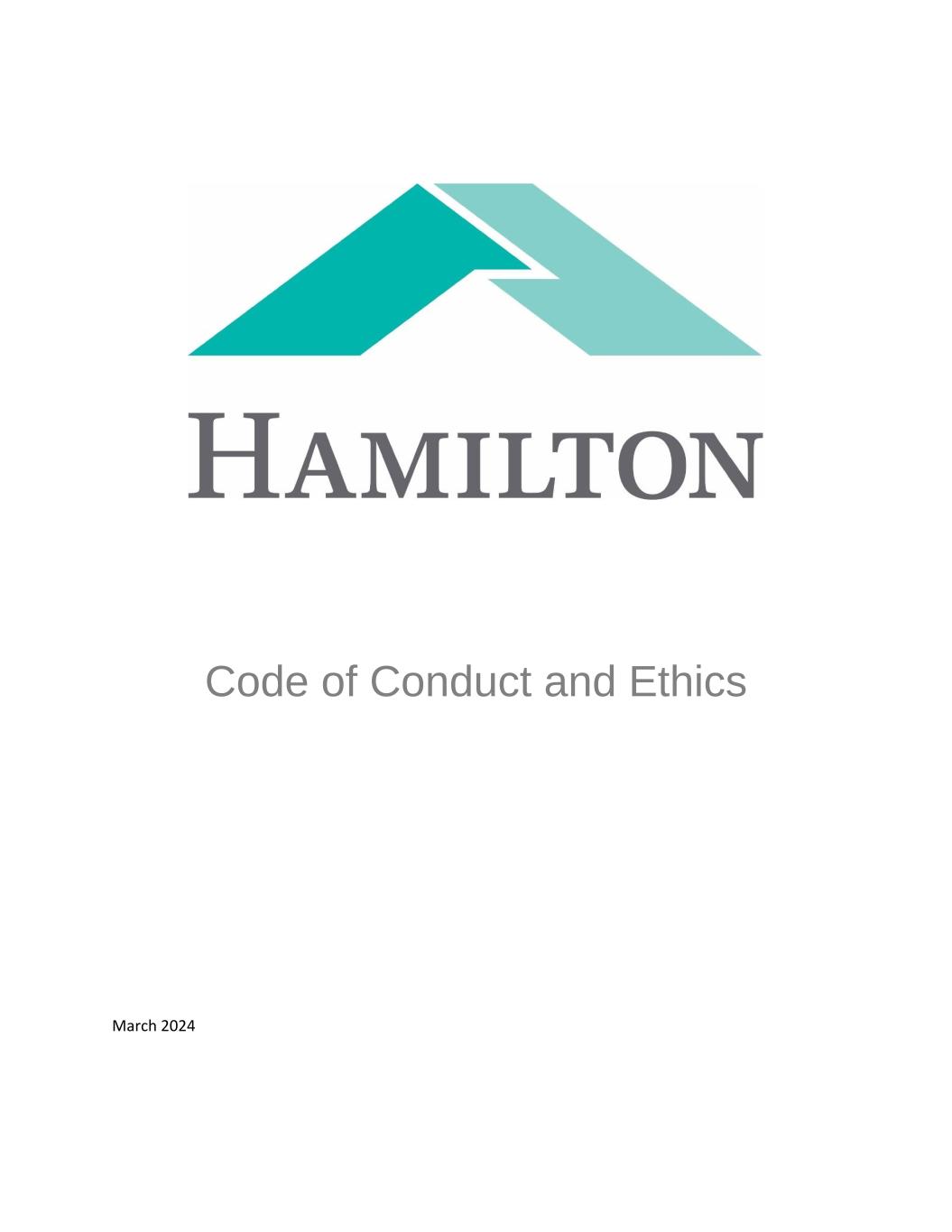
Code of Conduct and Ethics March 2024
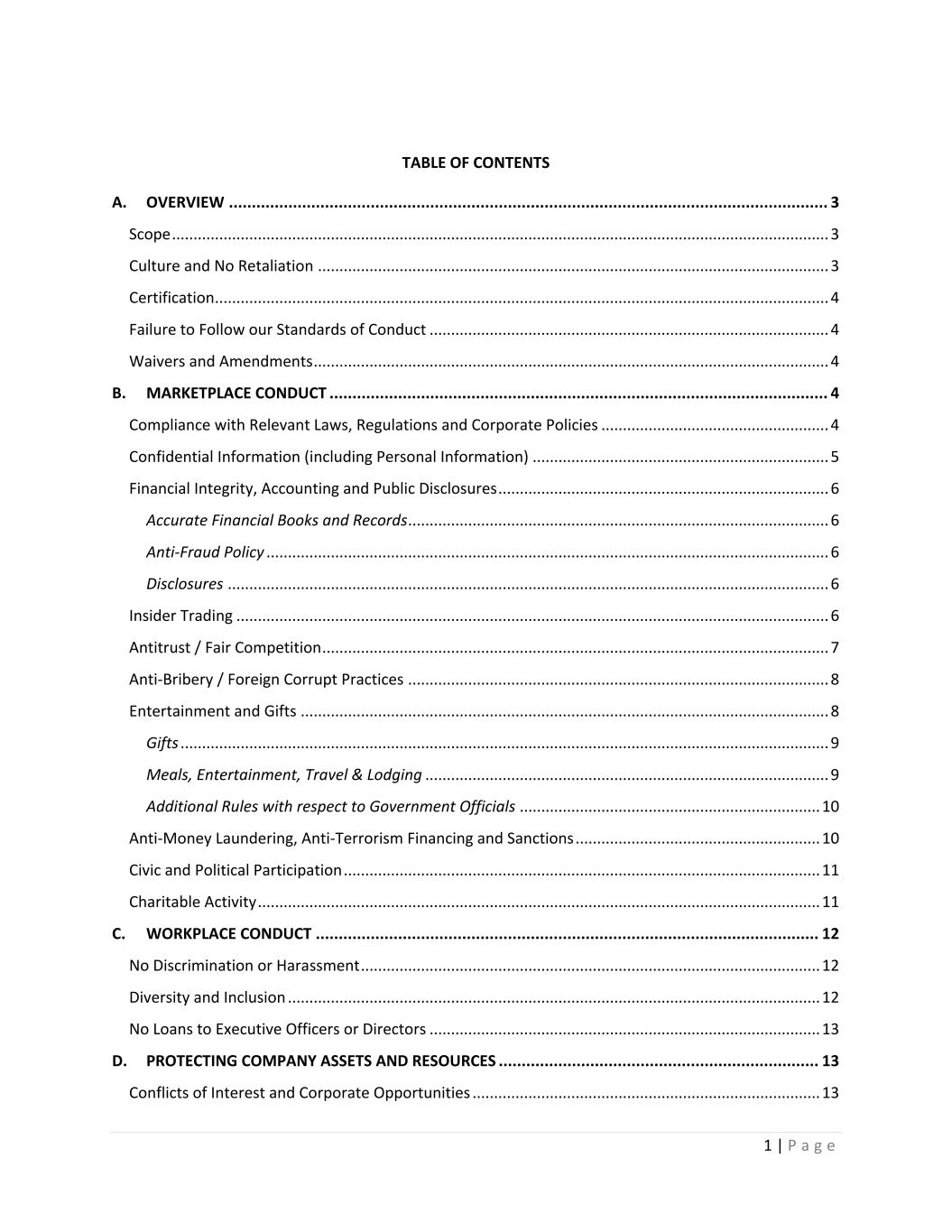
1 | P a g e TABLE OF CONTENTS A. OVERVIEW ................................................................................................................................... 3 Scope ......................................................................................................................................................... 3 Culture and No Retaliation ....................................................................................................................... 3 Certification ............................................................................................................................................... 4 Failure to Follow our Standards of Conduct ............................................................................................. 4 Waivers and Amendments ........................................................................................................................ 4 B. MARKETPLACE CONDUCT ............................................................................................................. 4 Compliance with Relevant Laws, Regulations and Corporate Policies ..................................................... 4 Confidential Information (including Personal Information) ..................................................................... 5 Financial Integrity, Accounting and Public Disclosures ............................................................................. 6 Accurate Financial Books and Records .................................................................................................. 6 Anti-Fraud Policy ................................................................................................................................... 6 Disclosures ............................................................................................................................................ 6 Insider Trading .......................................................................................................................................... 6 Antitrust / Fair Competition ...................................................................................................................... 7 Anti-Bribery / Foreign Corrupt Practices .................................................................................................. 8 Entertainment and Gifts ........................................................................................................................... 8 Gifts ....................................................................................................................................................... 9 Meals, Entertainment, Travel & Lodging .............................................................................................. 9 Additional Rules with respect to Government Officials ...................................................................... 10 Anti-Money Laundering, Anti-Terrorism Financing and Sanctions ......................................................... 10 Civic and Political Participation ............................................................................................................... 11 Charitable Activity ................................................................................................................................... 11 C. WORKPLACE CONDUCT .............................................................................................................. 12 No Discrimination or Harassment ........................................................................................................... 12 Diversity and Inclusion ............................................................................................................................ 12 No Loans to Executive Officers or Directors ........................................................................................... 13 D. PROTECTING COMPANY ASSETS AND RESOURCES ...................................................................... 13 Conflicts of Interest and Corporate Opportunities ................................................................................. 13
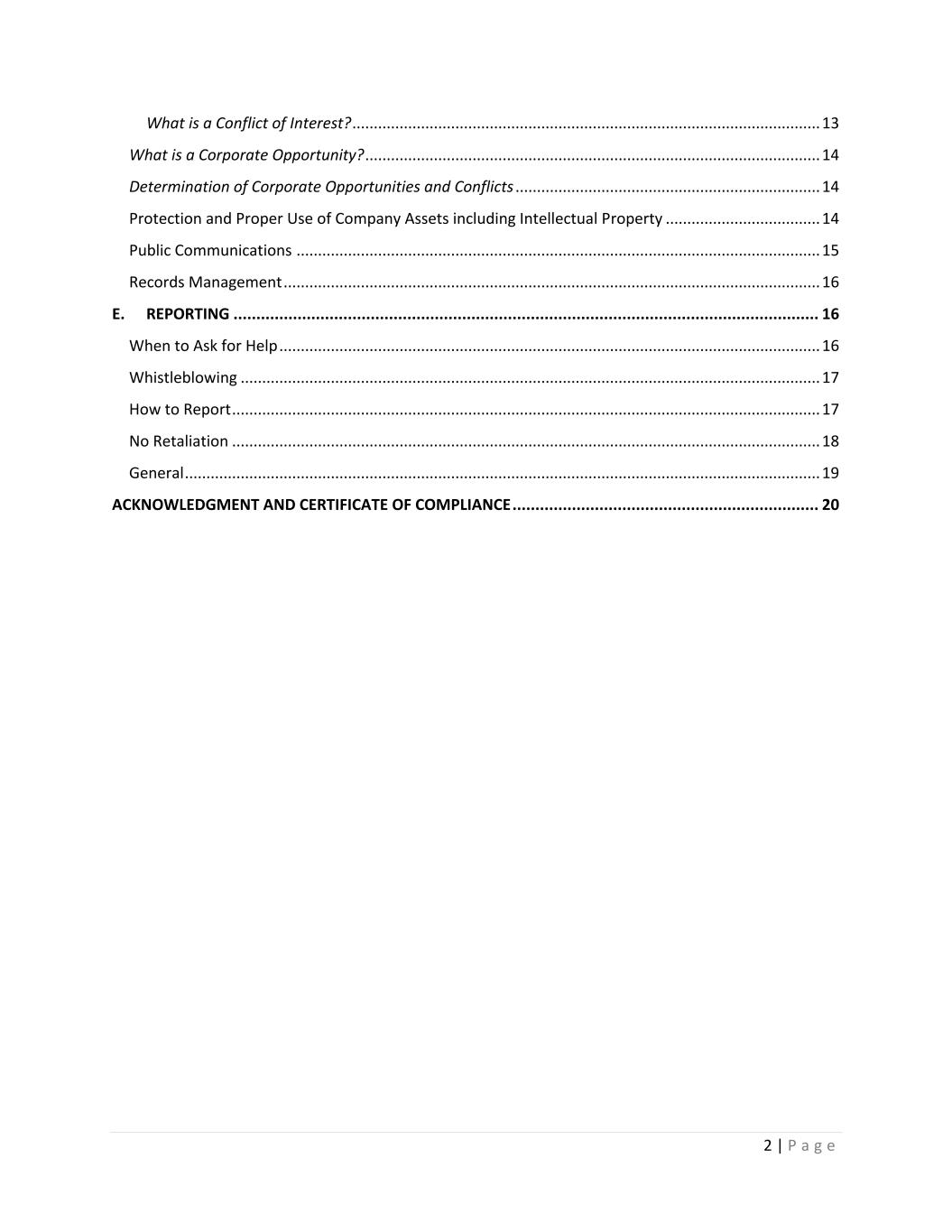
2 | P a g e What is a Conflict of Interest? ............................................................................................................. 13 What is a Corporate Opportunity? .......................................................................................................... 14 Determination of Corporate Opportunities and Conflicts ....................................................................... 14 Protection and Proper Use of Company Assets including Intellectual Property .................................... 14 Public Communications .......................................................................................................................... 15 Records Management ............................................................................................................................. 16 E. REPORTING ................................................................................................................................ 16 When to Ask for Help .............................................................................................................................. 16 Whistleblowing ....................................................................................................................................... 17 How to Report ......................................................................................................................................... 17 No Retaliation ......................................................................................................................................... 18 General .................................................................................................................................................... 19 ACKNOWLEDGMENT AND CERTIFICATE OF COMPLIANCE ................................................................... 20
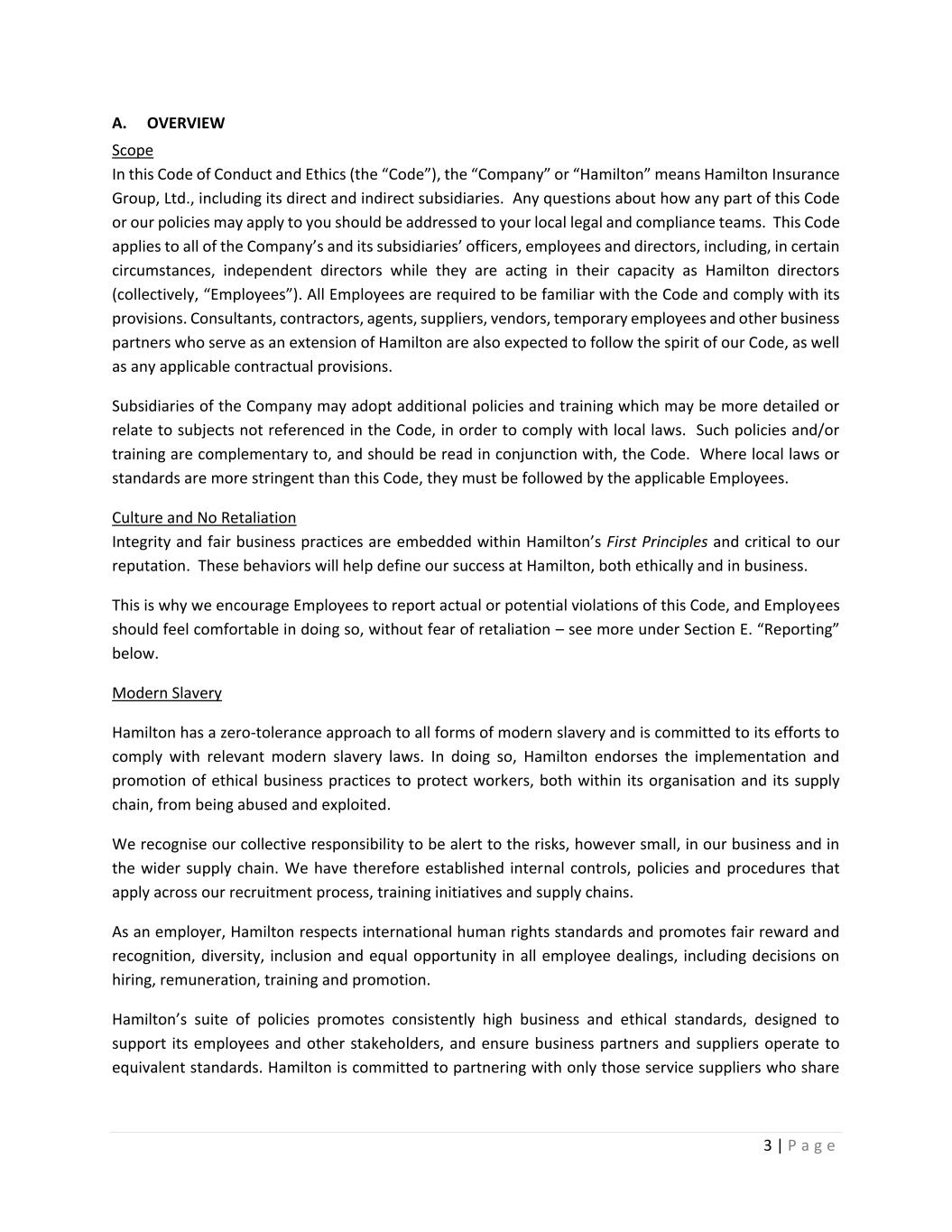
3 | P a g e A. OVERVIEW Scope In this Code of Conduct and Ethics (the “Code”), the “Company” or “Hamilton” means Hamilton Insurance Group, Ltd., including its direct and indirect subsidiaries. Any questions about how any part of this Code or our policies may apply to you should be addressed to your local legal and compliance teams. This Code applies to all of the Company’s and its subsidiaries’ officers, employees and directors, including, in certain circumstances, independent directors while they are acting in their capacity as Hamilton directors (collectively, “Employees”). All Employees are required to be familiar with the Code and comply with its provisions. Consultants, contractors, agents, suppliers, vendors, temporary employees and other business partners who serve as an extension of Hamilton are also expected to follow the spirit of our Code, as well as any applicable contractual provisions. Subsidiaries of the Company may adopt additional policies and training which may be more detailed or relate to subjects not referenced in the Code, in order to comply with local laws. Such policies and/or training are complementary to, and should be read in conjunction with, the Code. Where local laws or standards are more stringent than this Code, they must be followed by the applicable Employees. Culture and No Retaliation Integrity and fair business practices are embedded within Hamilton’s First Principles and critical to our reputation. These behaviors will help define our success at Hamilton, both ethically and in business. This is why we encourage Employees to report actual or potential violations of this Code, and Employees should feel comfortable in doing so, without fear of retaliation – see more under Section E. “Reporting” below. Modern Slavery Hamilton has a zero-tolerance approach to all forms of modern slavery and is committed to its efforts to comply with relevant modern slavery laws. In doing so, Hamilton endorses the implementation and promotion of ethical business practices to protect workers, both within its organisation and its supply chain, from being abused and exploited. We recognise our collective responsibility to be alert to the risks, however small, in our business and in the wider supply chain. We have therefore established internal controls, policies and procedures that apply across our recruitment process, training initiatives and supply chains. As an employer, Hamilton respects international human rights standards and promotes fair reward and recognition, diversity, inclusion and equal opportunity in all employee dealings, including decisions on hiring, remuneration, training and promotion. Hamilton’s suite of policies promotes consistently high business and ethical standards, designed to support its employees and other stakeholders, and ensure business partners and suppliers operate to equivalent standards. Hamilton is committed to partnering with only those service suppliers who share
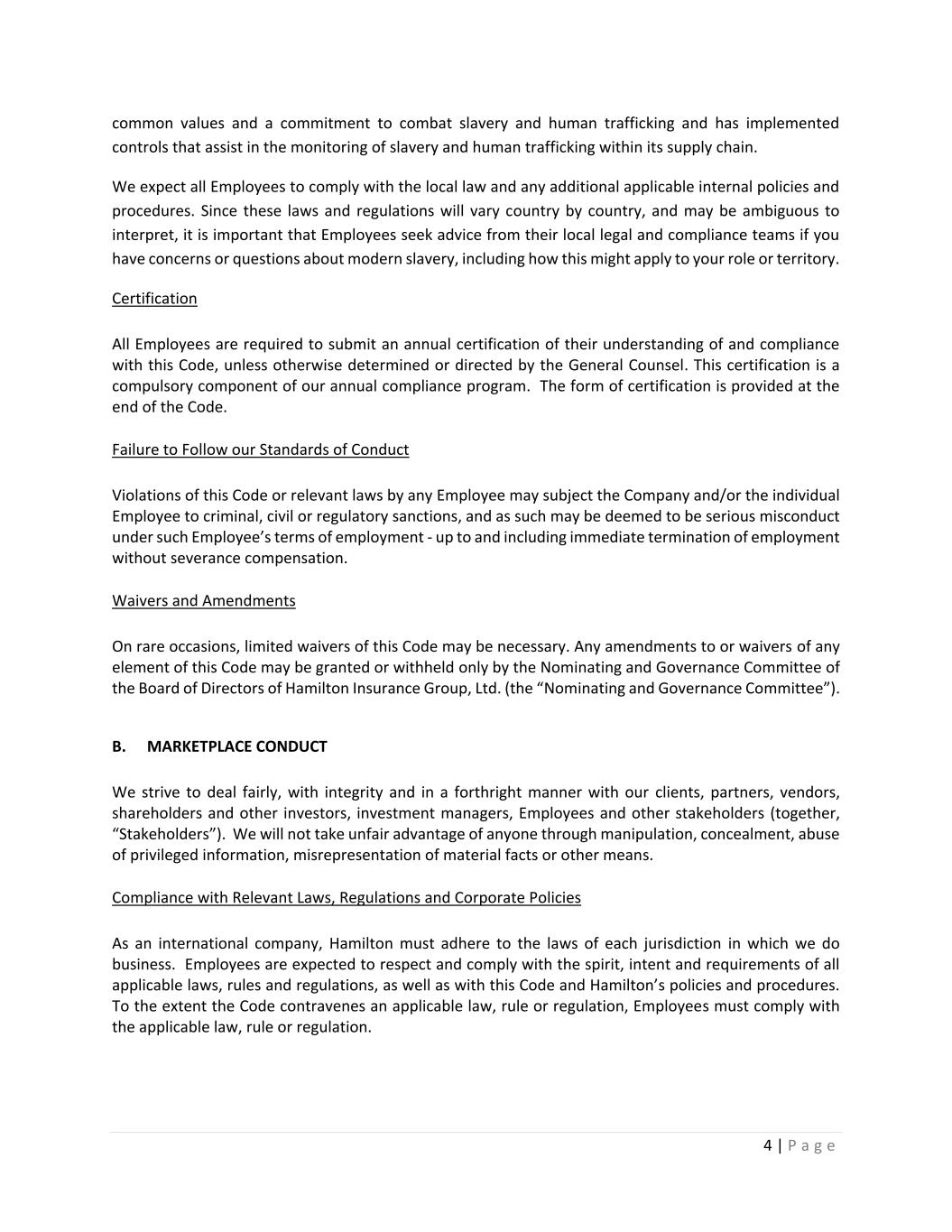
4 | P a g e common values and a commitment to combat slavery and human trafficking and has implemented controls that assist in the monitoring of slavery and human trafficking within its supply chain. We expect all Employees to comply with the local law and any additional applicable internal policies and procedures. Since these laws and regulations will vary country by country, and may be ambiguous to interpret, it is important that Employees seek advice from their local legal and compliance teams if you have concerns or questions about modern slavery, including how this might apply to your role or territory. Certification All Employees are required to submit an annual certification of their understanding of and compliance with this Code, unless otherwise determined or directed by the General Counsel. This certification is a compulsory component of our annual compliance program. The form of certification is provided at the end of the Code. Failure to Follow our Standards of Conduct Violations of this Code or relevant laws by any Employee may subject the Company and/or the individual Employee to criminal, civil or regulatory sanctions, and as such may be deemed to be serious misconduct under such Employee’s terms of employment - up to and including immediate termination of employment without severance compensation. Waivers and Amendments On rare occasions, limited waivers of this Code may be necessary. Any amendments to or waivers of any element of this Code may be granted or withheld only by the Nominating and Governance Committee of the Board of Directors of Hamilton Insurance Group, Ltd. (the “Nominating and Governance Committee”). B. MARKETPLACE CONDUCT We strive to deal fairly, with integrity and in a forthright manner with our clients, partners, vendors, shareholders and other investors, investment managers, Employees and other stakeholders (together, “Stakeholders”). We will not take unfair advantage of anyone through manipulation, concealment, abuse of privileged information, misrepresentation of material facts or other means. Compliance with Relevant Laws, Regulations and Corporate Policies As an international company, Hamilton must adhere to the laws of each jurisdiction in which we do business. Employees are expected to respect and comply with the spirit, intent and requirements of all applicable laws, rules and regulations, as well as with this Code and Hamilton’s policies and procedures. To the extent the Code contravenes an applicable law, rule or regulation, Employees must comply with the applicable law, rule or regulation.
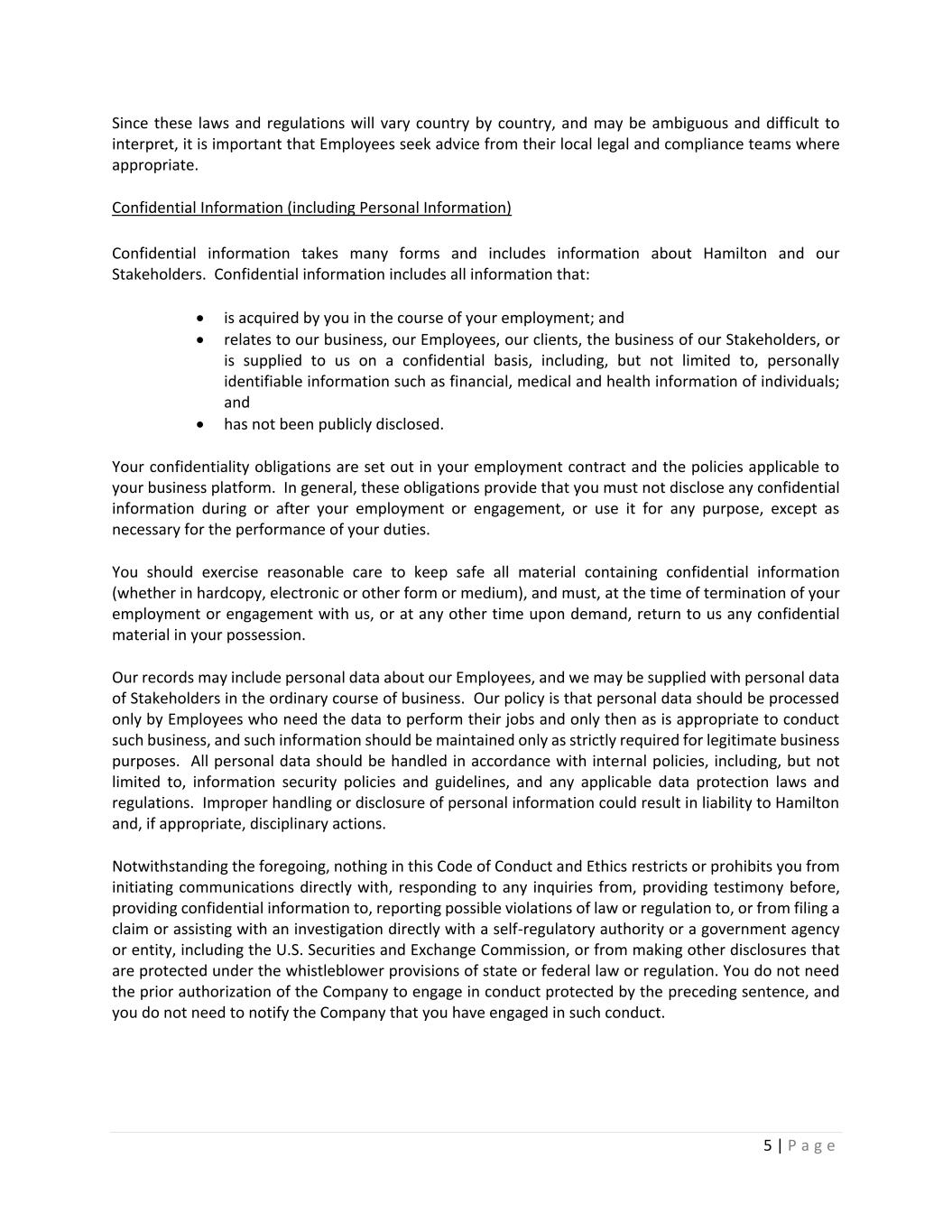
5 | P a g e Since these laws and regulations will vary country by country, and may be ambiguous and difficult to interpret, it is important that Employees seek advice from their local legal and compliance teams where appropriate. Confidential Information (including Personal Information) Confidential information takes many forms and includes information about Hamilton and our Stakeholders. Confidential information includes all information that: • is acquired by you in the course of your employment; and • relates to our business, our Employees, our clients, the business of our Stakeholders, or is supplied to us on a confidential basis, including, but not limited to, personally identifiable information such as financial, medical and health information of individuals; and • has not been publicly disclosed. Your confidentiality obligations are set out in your employment contract and the policies applicable to your business platform. In general, these obligations provide that you must not disclose any confidential information during or after your employment or engagement, or use it for any purpose, except as necessary for the performance of your duties. You should exercise reasonable care to keep safe all material containing confidential information (whether in hardcopy, electronic or other form or medium), and must, at the time of termination of your employment or engagement with us, or at any other time upon demand, return to us any confidential material in your possession. Our records may include personal data about our Employees, and we may be supplied with personal data of Stakeholders in the ordinary course of business. Our policy is that personal data should be processed only by Employees who need the data to perform their jobs and only then as is appropriate to conduct such business, and such information should be maintained only as strictly required for legitimate business purposes. All personal data should be handled in accordance with internal policies, including, but not limited to, information security policies and guidelines, and any applicable data protection laws and regulations. Improper handling or disclosure of personal information could result in liability to Hamilton and, if appropriate, disciplinary actions. Notwithstanding the foregoing, nothing in this Code of Conduct and Ethics restricts or prohibits you from initiating communications directly with, responding to any inquiries from, providing testimony before, providing confidential information to, reporting possible violations of law or regulation to, or from filing a claim or assisting with an investigation directly with a self-regulatory authority or a government agency or entity, including the U.S. Securities and Exchange Commission, or from making other disclosures that are protected under the whistleblower provisions of state or federal law or regulation. You do not need the prior authorization of the Company to engage in conduct protected by the preceding sentence, and you do not need to notify the Company that you have engaged in such conduct.
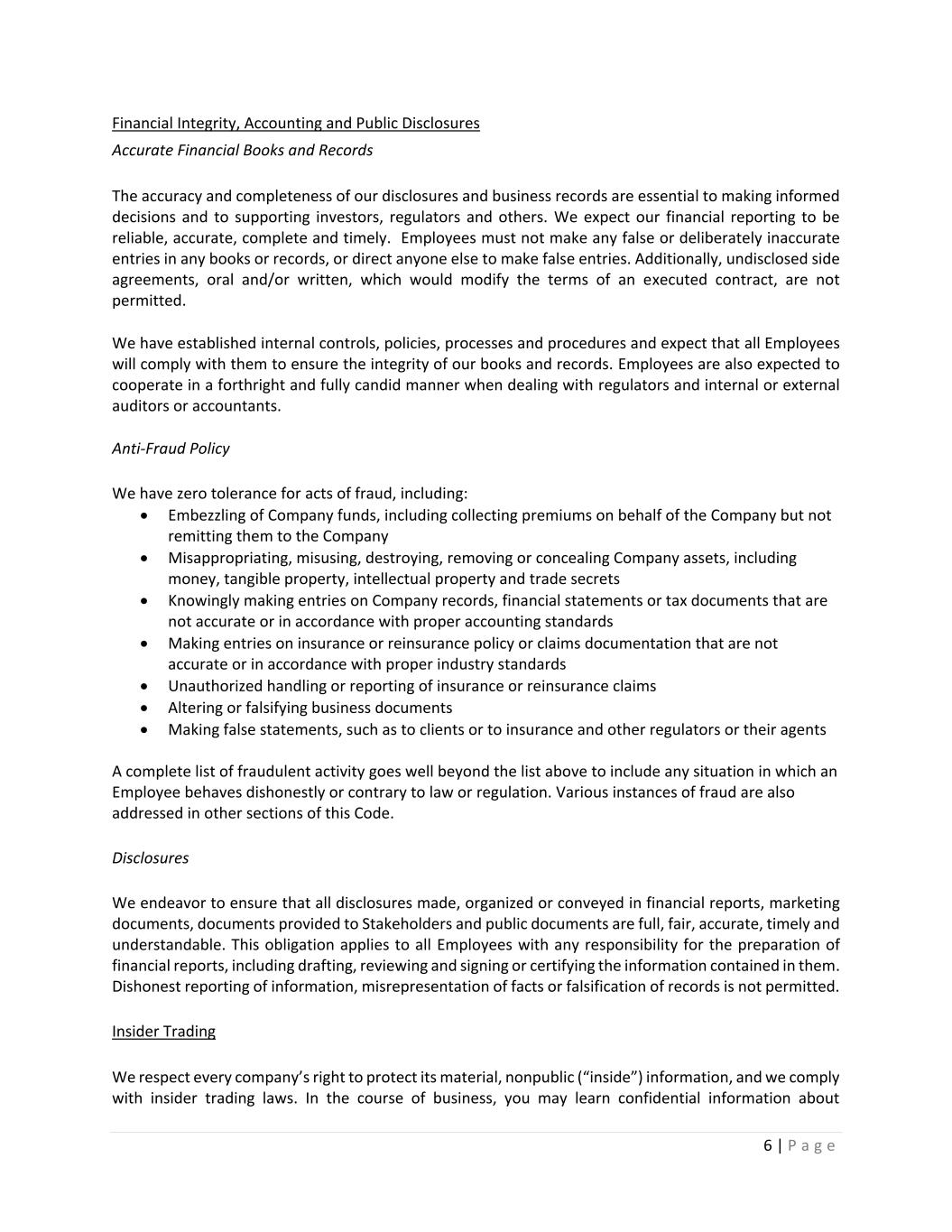
6 | P a g e Financial Integrity, Accounting and Public Disclosures Accurate Financial Books and Records The accuracy and completeness of our disclosures and business records are essential to making informed decisions and to supporting investors, regulators and others. We expect our financial reporting to be reliable, accurate, complete and timely. Employees must not make any false or deliberately inaccurate entries in any books or records, or direct anyone else to make false entries. Additionally, undisclosed side agreements, oral and/or written, which would modify the terms of an executed contract, are not permitted. We have established internal controls, policies, processes and procedures and expect that all Employees will comply with them to ensure the integrity of our books and records. Employees are also expected to cooperate in a forthright and fully candid manner when dealing with regulators and internal or external auditors or accountants. Anti-Fraud Policy We have zero tolerance for acts of fraud, including: • Embezzling of Company funds, including collecting premiums on behalf of the Company but not remitting them to the Company • Misappropriating, misusing, destroying, removing or concealing Company assets, including money, tangible property, intellectual property and trade secrets • Knowingly making entries on Company records, financial statements or tax documents that are not accurate or in accordance with proper accounting standards • Making entries on insurance or reinsurance policy or claims documentation that are not accurate or in accordance with proper industry standards • Unauthorized handling or reporting of insurance or reinsurance claims • Altering or falsifying business documents • Making false statements, such as to clients or to insurance and other regulators or their agents A complete list of fraudulent activity goes well beyond the list above to include any situation in which an Employee behaves dishonestly or contrary to law or regulation. Various instances of fraud are also addressed in other sections of this Code. Disclosures We endeavor to ensure that all disclosures made, organized or conveyed in financial reports, marketing documents, documents provided to Stakeholders and public documents are full, fair, accurate, timely and understandable. This obligation applies to all Employees with any responsibility for the preparation of financial reports, including drafting, reviewing and signing or certifying the information contained in them. Dishonest reporting of information, misrepresentation of facts or falsification of records is not permitted. Insider Trading We respect every company’s right to protect its material, nonpublic (“inside”) information, and we comply with insider trading laws. In the course of business, you may learn confidential information about
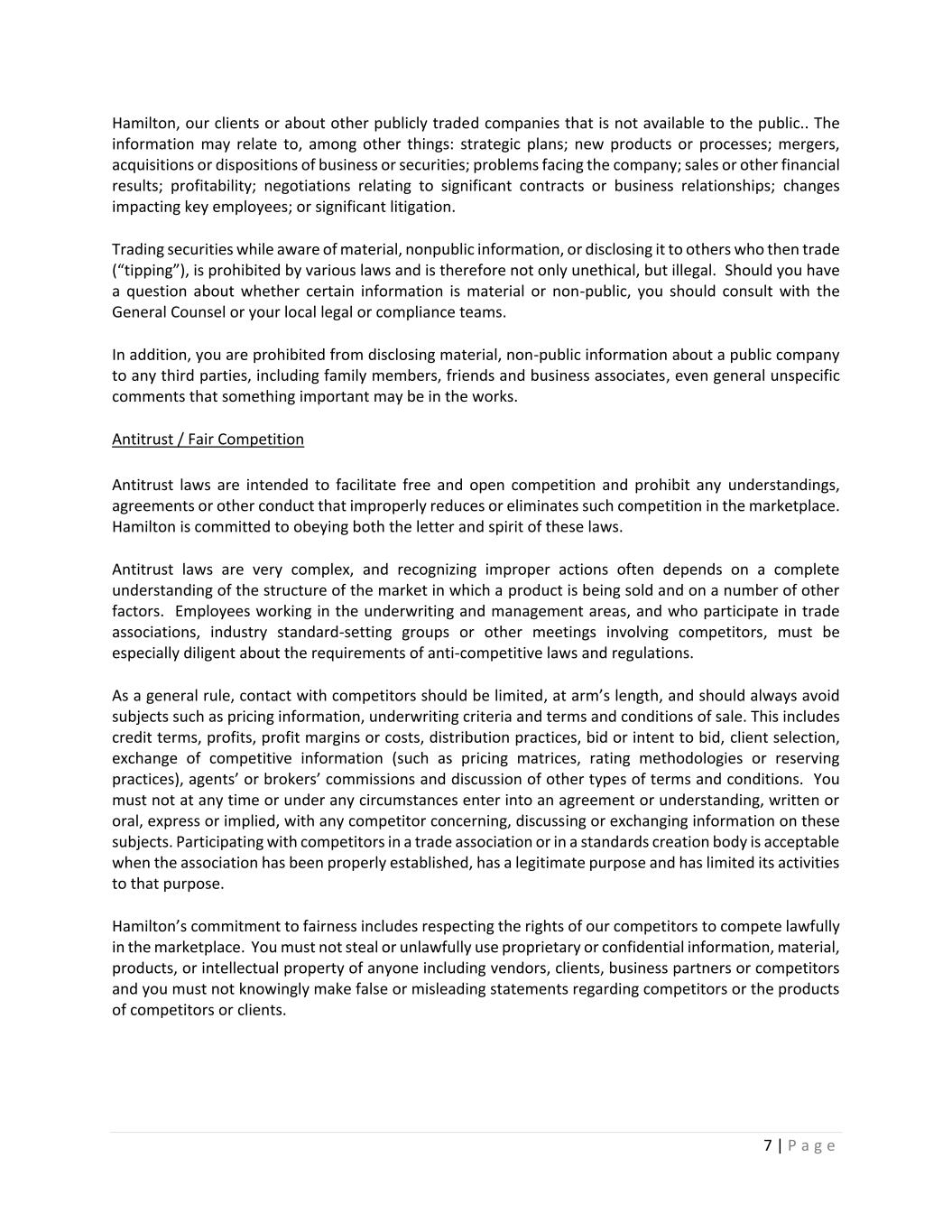
7 | P a g e Hamilton, our clients or about other publicly traded companies that is not available to the public.. The information may relate to, among other things: strategic plans; new products or processes; mergers, acquisitions or dispositions of business or securities; problems facing the company; sales or other financial results; profitability; negotiations relating to significant contracts or business relationships; changes impacting key employees; or significant litigation. Trading securities while aware of material, nonpublic information, or disclosing it to others who then trade (“tipping”), is prohibited by various laws and is therefore not only unethical, but illegal. Should you have a question about whether certain information is material or non-public, you should consult with the General Counsel or your local legal or compliance teams. In addition, you are prohibited from disclosing material, non-public information about a public company to any third parties, including family members, friends and business associates, even general unspecific comments that something important may be in the works. Antitrust / Fair Competition Antitrust laws are intended to facilitate free and open competition and prohibit any understandings, agreements or other conduct that improperly reduces or eliminates such competition in the marketplace. Hamilton is committed to obeying both the letter and spirit of these laws. Antitrust laws are very complex, and recognizing improper actions often depends on a complete understanding of the structure of the market in which a product is being sold and on a number of other factors. Employees working in the underwriting and management areas, and who participate in trade associations, industry standard-setting groups or other meetings involving competitors, must be especially diligent about the requirements of anti-competitive laws and regulations. As a general rule, contact with competitors should be limited, at arm’s length, and should always avoid subjects such as pricing information, underwriting criteria and terms and conditions of sale. This includes credit terms, profits, profit margins or costs, distribution practices, bid or intent to bid, client selection, exchange of competitive information (such as pricing matrices, rating methodologies or reserving practices), agents’ or brokers’ commissions and discussion of other types of terms and conditions. You must not at any time or under any circumstances enter into an agreement or understanding, written or oral, express or implied, with any competitor concerning, discussing or exchanging information on these subjects. Participating with competitors in a trade association or in a standards creation body is acceptable when the association has been properly established, has a legitimate purpose and has limited its activities to that purpose. Hamilton’s commitment to fairness includes respecting the rights of our competitors to compete lawfully in the marketplace. You must not steal or unlawfully use proprietary or confidential information, material, products, or intellectual property of anyone including vendors, clients, business partners or competitors and you must not knowingly make false or misleading statements regarding competitors or the products of competitors or clients.
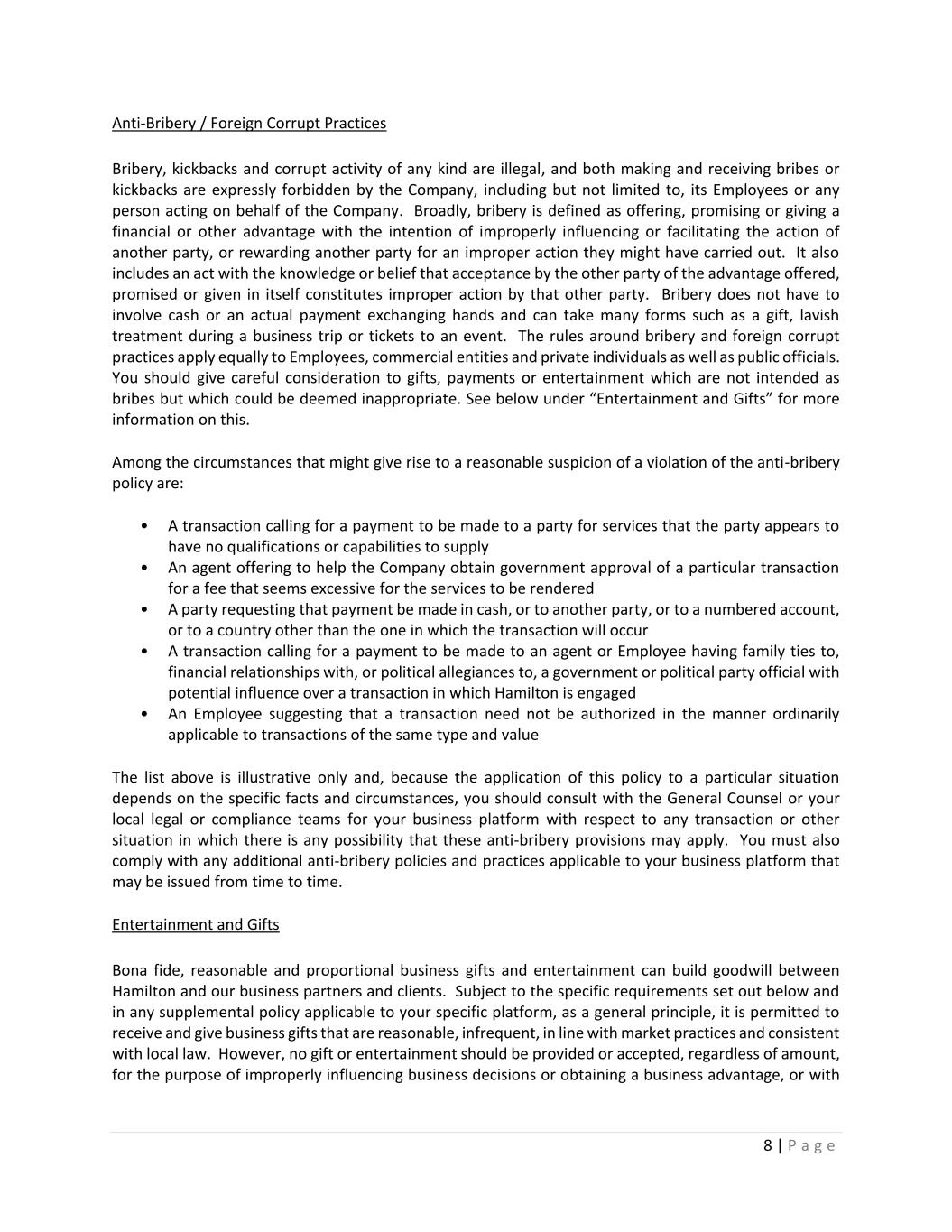
8 | P a g e Anti-Bribery / Foreign Corrupt Practices Bribery, kickbacks and corrupt activity of any kind are illegal, and both making and receiving bribes or kickbacks are expressly forbidden by the Company, including but not limited to, its Employees or any person acting on behalf of the Company. Broadly, bribery is defined as offering, promising or giving a financial or other advantage with the intention of improperly influencing or facilitating the action of another party, or rewarding another party for an improper action they might have carried out. It also includes an act with the knowledge or belief that acceptance by the other party of the advantage offered, promised or given in itself constitutes improper action by that other party. Bribery does not have to involve cash or an actual payment exchanging hands and can take many forms such as a gift, lavish treatment during a business trip or tickets to an event. The rules around bribery and foreign corrupt practices apply equally to Employees, commercial entities and private individuals as well as public officials. You should give careful consideration to gifts, payments or entertainment which are not intended as bribes but which could be deemed inappropriate. See below under “Entertainment and Gifts” for more information on this. Among the circumstances that might give rise to a reasonable suspicion of a violation of the anti-bribery policy are: • A transaction calling for a payment to be made to a party for services that the party appears to have no qualifications or capabilities to supply • An agent offering to help the Company obtain government approval of a particular transaction for a fee that seems excessive for the services to be rendered • A party requesting that payment be made in cash, or to another party, or to a numbered account, or to a country other than the one in which the transaction will occur • A transaction calling for a payment to be made to an agent or Employee having family ties to, financial relationships with, or political allegiances to, a government or political party official with potential influence over a transaction in which Hamilton is engaged • An Employee suggesting that a transaction need not be authorized in the manner ordinarily applicable to transactions of the same type and value The list above is illustrative only and, because the application of this policy to a particular situation depends on the specific facts and circumstances, you should consult with the General Counsel or your local legal or compliance teams for your business platform with respect to any transaction or other situation in which there is any possibility that these anti-bribery provisions may apply. You must also comply with any additional anti-bribery policies and practices applicable to your business platform that may be issued from time to time. Entertainment and Gifts Bona fide, reasonable and proportional business gifts and entertainment can build goodwill between Hamilton and our business partners and clients. Subject to the specific requirements set out below and in any supplemental policy applicable to your specific platform, as a general principle, it is permitted to receive and give business gifts that are reasonable, infrequent, in line with market practices and consistent with local law. However, no gift or entertainment should be provided or accepted, regardless of amount, for the purpose of improperly influencing business decisions or obtaining a business advantage, or with
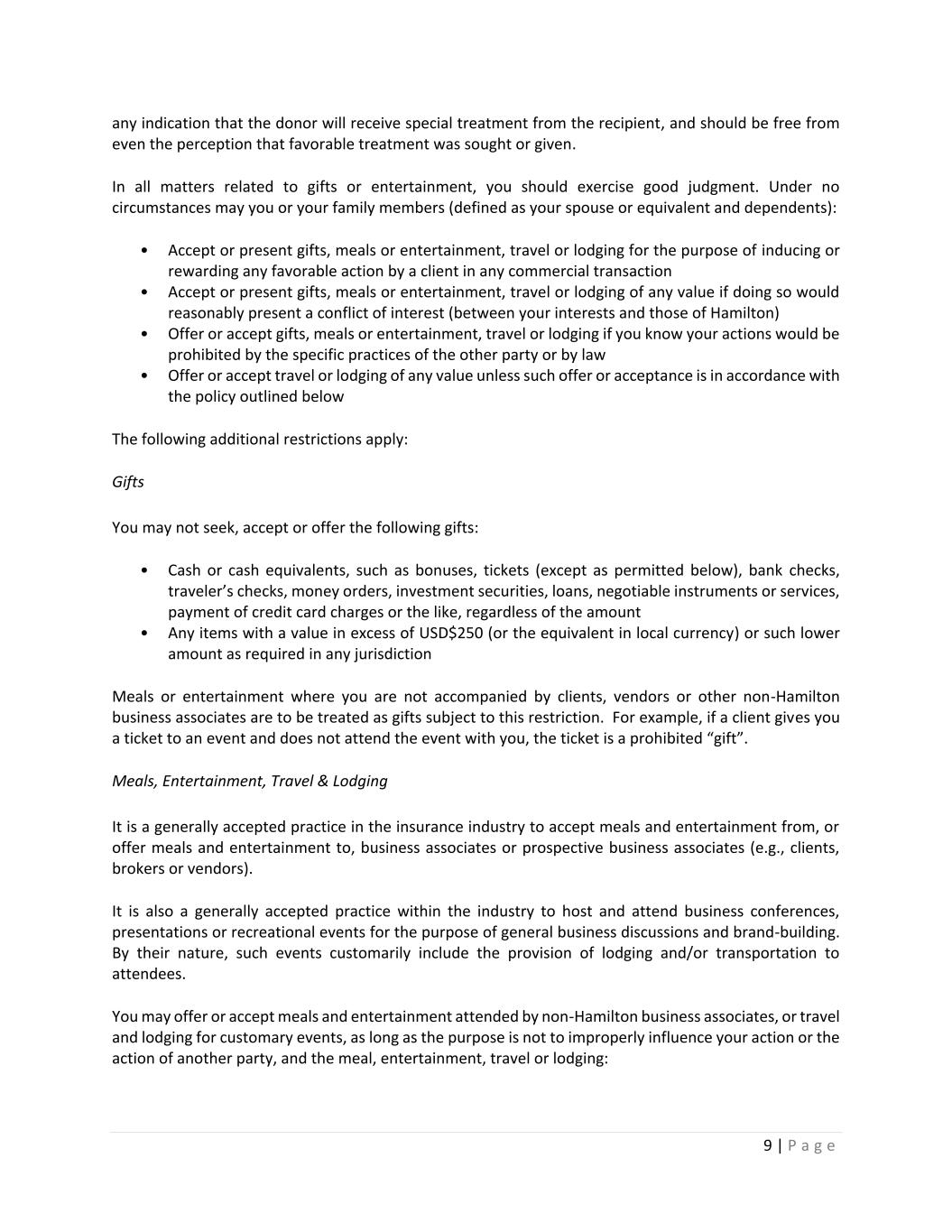
9 | P a g e any indication that the donor will receive special treatment from the recipient, and should be free from even the perception that favorable treatment was sought or given. In all matters related to gifts or entertainment, you should exercise good judgment. Under no circumstances may you or your family members (defined as your spouse or equivalent and dependents): • Accept or present gifts, meals or entertainment, travel or lodging for the purpose of inducing or rewarding any favorable action by a client in any commercial transaction • Accept or present gifts, meals or entertainment, travel or lodging of any value if doing so would reasonably present a conflict of interest (between your interests and those of Hamilton) • Offer or accept gifts, meals or entertainment, travel or lodging if you know your actions would be prohibited by the specific practices of the other party or by law • Offer or accept travel or lodging of any value unless such offer or acceptance is in accordance with the policy outlined below The following additional restrictions apply: Gifts You may not seek, accept or offer the following gifts: • Cash or cash equivalents, such as bonuses, tickets (except as permitted below), bank checks, traveler’s checks, money orders, investment securities, loans, negotiable instruments or services, payment of credit card charges or the like, regardless of the amount • Any items with a value in excess of USD$250 (or the equivalent in local currency) or such lower amount as required in any jurisdiction Meals or entertainment where you are not accompanied by clients, vendors or other non-Hamilton business associates are to be treated as gifts subject to this restriction. For example, if a client gives you a ticket to an event and does not attend the event with you, the ticket is a prohibited “gift”. Meals, Entertainment, Travel & Lodging It is a generally accepted practice in the insurance industry to accept meals and entertainment from, or offer meals and entertainment to, business associates or prospective business associates (e.g., clients, brokers or vendors). It is also a generally accepted practice within the industry to host and attend business conferences, presentations or recreational events for the purpose of general business discussions and brand-building. By their nature, such events customarily include the provision of lodging and/or transportation to attendees. You may offer or accept meals and entertainment attended by non-Hamilton business associates, or travel and lodging for customary events, as long as the purpose is not to improperly influence your action or the action of another party, and the meal, entertainment, travel or lodging:
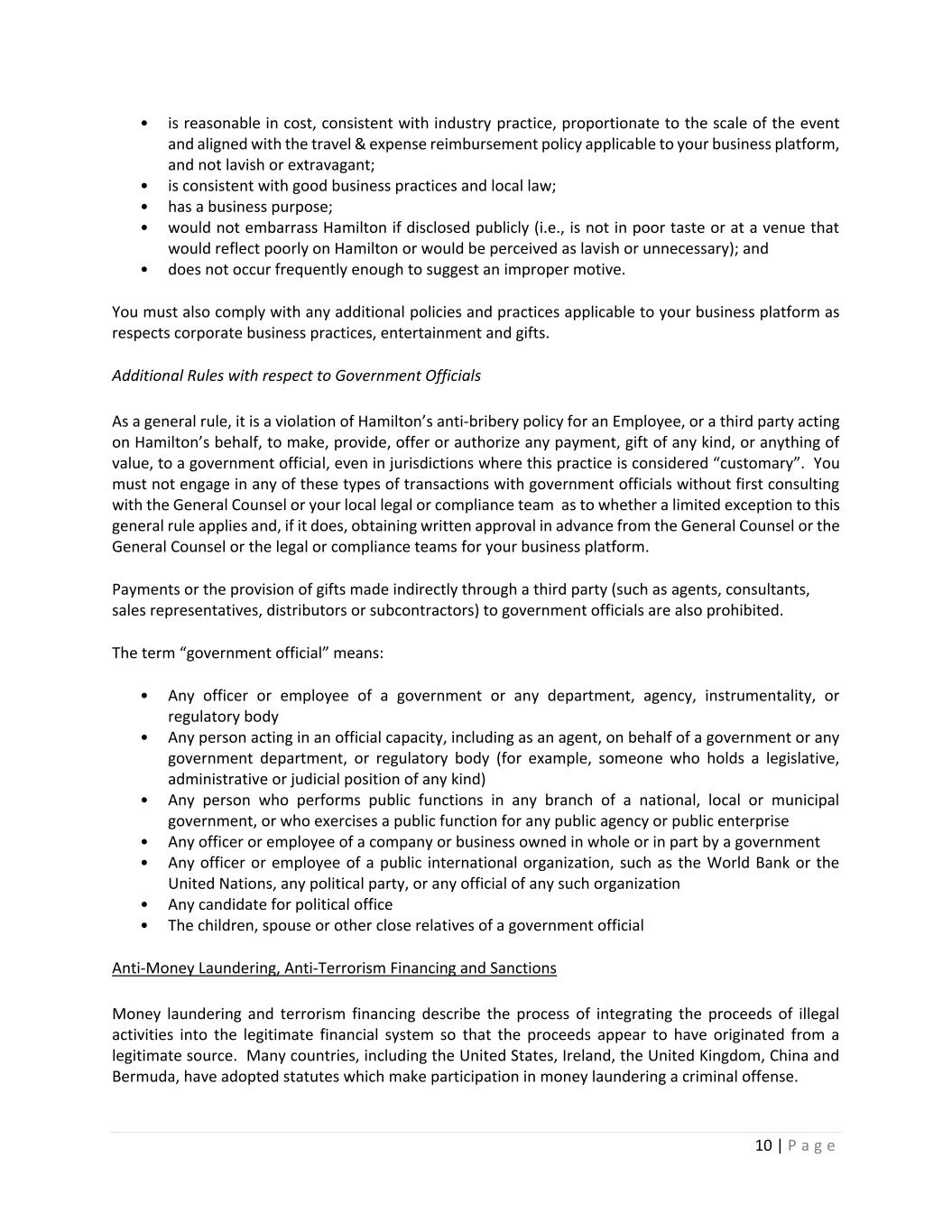
10 | P a g e • is reasonable in cost, consistent with industry practice, proportionate to the scale of the event and aligned with the travel & expense reimbursement policy applicable to your business platform, and not lavish or extravagant; • is consistent with good business practices and local law; • has a business purpose; • would not embarrass Hamilton if disclosed publicly (i.e., is not in poor taste or at a venue that would reflect poorly on Hamilton or would be perceived as lavish or unnecessary); and • does not occur frequently enough to suggest an improper motive. You must also comply with any additional policies and practices applicable to your business platform as respects corporate business practices, entertainment and gifts. Additional Rules with respect to Government Officials As a general rule, it is a violation of Hamilton’s anti-bribery policy for an Employee, or a third party acting on Hamilton’s behalf, to make, provide, offer or authorize any payment, gift of any kind, or anything of value, to a government official, even in jurisdictions where this practice is considered “customary”. You must not engage in any of these types of transactions with government officials without first consulting with the General Counsel or your local legal or compliance team as to whether a limited exception to this general rule applies and, if it does, obtaining written approval in advance from the General Counsel or the General Counsel or the legal or compliance teams for your business platform. Payments or the provision of gifts made indirectly through a third party (such as agents, consultants, sales representatives, distributors or subcontractors) to government officials are also prohibited. The term “government official” means: • Any officer or employee of a government or any department, agency, instrumentality, or regulatory body • Any person acting in an official capacity, including as an agent, on behalf of a government or any government department, or regulatory body (for example, someone who holds a legislative, administrative or judicial position of any kind) • Any person who performs public functions in any branch of a national, local or municipal government, or who exercises a public function for any public agency or public enterprise • Any officer or employee of a company or business owned in whole or in part by a government • Any officer or employee of a public international organization, such as the World Bank or the United Nations, any political party, or any official of any such organization • Any candidate for political office • The children, spouse or other close relatives of a government official Anti-Money Laundering, Anti-Terrorism Financing and Sanctions Money laundering and terrorism financing describe the process of integrating the proceeds of illegal activities into the legitimate financial system so that the proceeds appear to have originated from a legitimate source. Many countries, including the United States, Ireland, the United Kingdom, China and Bermuda, have adopted statutes which make participation in money laundering a criminal offense.
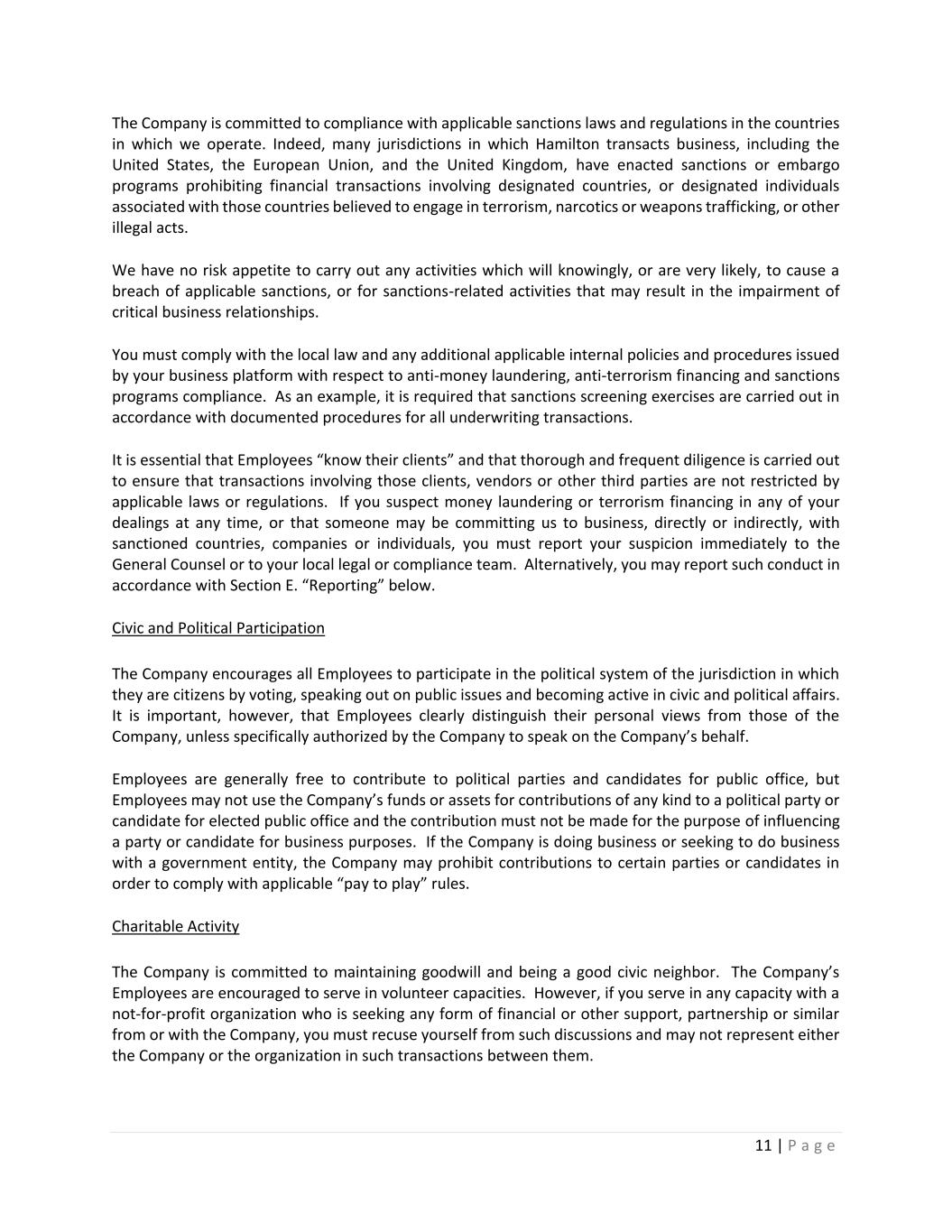
11 | P a g e The Company is committed to compliance with applicable sanctions laws and regulations in the countries in which we operate. Indeed, many jurisdictions in which Hamilton transacts business, including the United States, the European Union, and the United Kingdom, have enacted sanctions or embargo programs prohibiting financial transactions involving designated countries, or designated individuals associated with those countries believed to engage in terrorism, narcotics or weapons trafficking, or other illegal acts. We have no risk appetite to carry out any activities which will knowingly, or are very likely, to cause a breach of applicable sanctions, or for sanctions-related activities that may result in the impairment of critical business relationships. You must comply with the local law and any additional applicable internal policies and procedures issued by your business platform with respect to anti-money laundering, anti-terrorism financing and sanctions programs compliance. As an example, it is required that sanctions screening exercises are carried out in accordance with documented procedures for all underwriting transactions. It is essential that Employees “know their clients” and that thorough and frequent diligence is carried out to ensure that transactions involving those clients, vendors or other third parties are not restricted by applicable laws or regulations. If you suspect money laundering or terrorism financing in any of your dealings at any time, or that someone may be committing us to business, directly or indirectly, with sanctioned countries, companies or individuals, you must report your suspicion immediately to the General Counsel or to your local legal or compliance team. Alternatively, you may report such conduct in accordance with Section E. “Reporting” below. Civic and Political Participation The Company encourages all Employees to participate in the political system of the jurisdiction in which they are citizens by voting, speaking out on public issues and becoming active in civic and political affairs. It is important, however, that Employees clearly distinguish their personal views from those of the Company, unless specifically authorized by the Company to speak on the Company’s behalf. Employees are generally free to contribute to political parties and candidates for public office, but Employees may not use the Company’s funds or assets for contributions of any kind to a political party or candidate for elected public office and the contribution must not be made for the purpose of influencing a party or candidate for business purposes. If the Company is doing business or seeking to do business with a government entity, the Company may prohibit contributions to certain parties or candidates in order to comply with applicable “pay to play” rules. Charitable Activity The Company is committed to maintaining goodwill and being a good civic neighbor. The Company’s Employees are encouraged to serve in volunteer capacities. However, if you serve in any capacity with a not-for-profit organization who is seeking any form of financial or other support, partnership or similar from or with the Company, you must recuse yourself from such discussions and may not represent either the Company or the organization in such transactions between them.
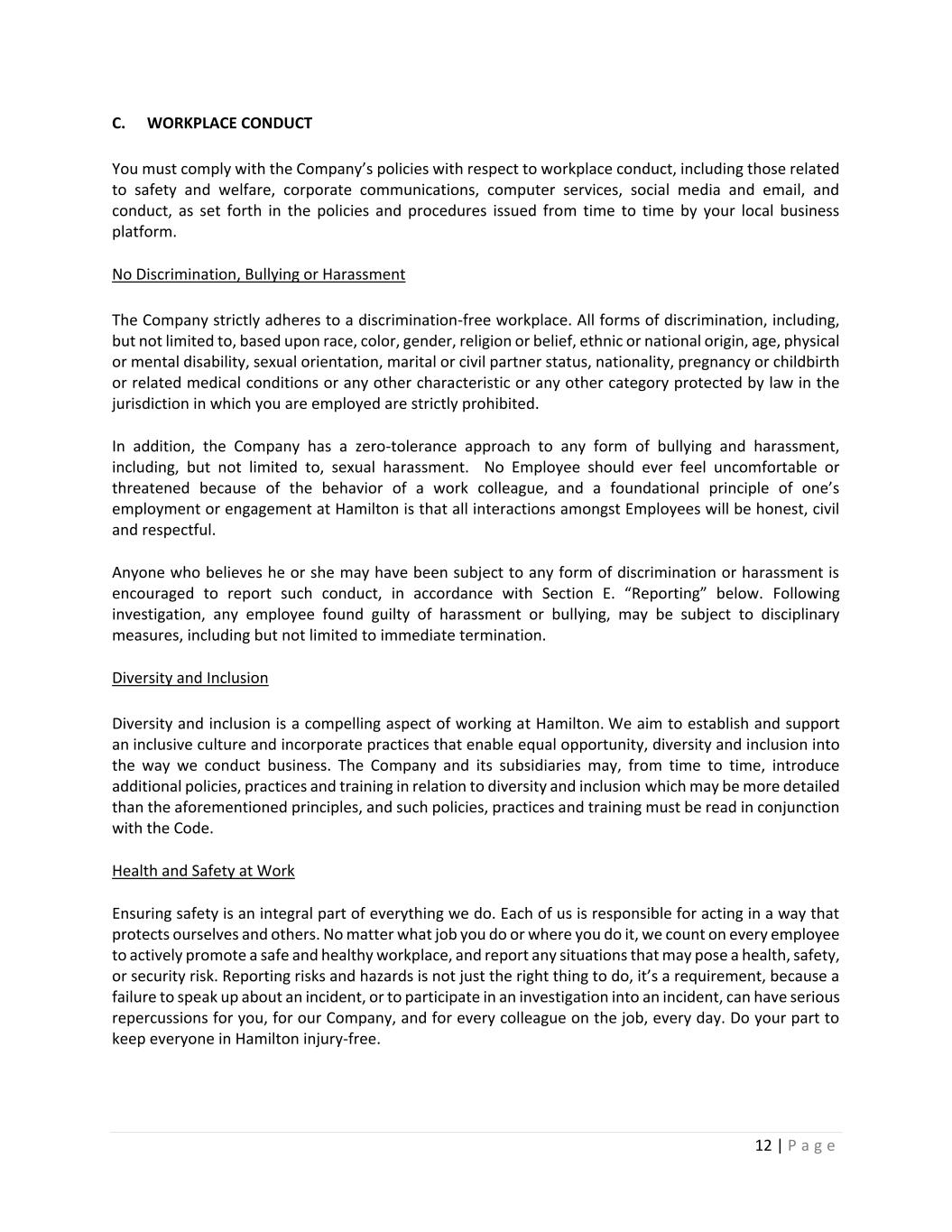
12 | P a g e C. WORKPLACE CONDUCT You must comply with the Company’s policies with respect to workplace conduct, including those related to safety and welfare, corporate communications, computer services, social media and email, and conduct, as set forth in the policies and procedures issued from time to time by your local business platform. No Discrimination, Bullying or Harassment The Company strictly adheres to a discrimination-free workplace. All forms of discrimination, including, but not limited to, based upon race, color, gender, religion or belief, ethnic or national origin, age, physical or mental disability, sexual orientation, marital or civil partner status, nationality, pregnancy or childbirth or related medical conditions or any other characteristic or any other category protected by law in the jurisdiction in which you are employed are strictly prohibited. In addition, the Company has a zero-tolerance approach to any form of bullying and harassment, including, but not limited to, sexual harassment. No Employee should ever feel uncomfortable or threatened because of the behavior of a work colleague, and a foundational principle of one’s employment or engagement at Hamilton is that all interactions amongst Employees will be honest, civil and respectful. Anyone who believes he or she may have been subject to any form of discrimination or harassment is encouraged to report such conduct, in accordance with Section E. “Reporting” below. Following investigation, any employee found guilty of harassment or bullying, may be subject to disciplinary measures, including but not limited to immediate termination. Diversity and Inclusion Diversity and inclusion is a compelling aspect of working at Hamilton. We aim to establish and support an inclusive culture and incorporate practices that enable equal opportunity, diversity and inclusion into the way we conduct business. The Company and its subsidiaries may, from time to time, introduce additional policies, practices and training in relation to diversity and inclusion which may be more detailed than the aforementioned principles, and such policies, practices and training must be read in conjunction with the Code. Health and Safety at Work Ensuring safety is an integral part of everything we do. Each of us is responsible for acting in a way that protects ourselves and others. No matter what job you do or where you do it, we count on every employee to actively promote a safe and healthy workplace, and report any situations that may pose a health, safety, or security risk. Reporting risks and hazards is not just the right thing to do, it’s a requirement, because a failure to speak up about an incident, or to participate in an investigation into an incident, can have serious repercussions for you, for our Company, and for every colleague on the job, every day. Do your part to keep everyone in Hamilton injury-free.
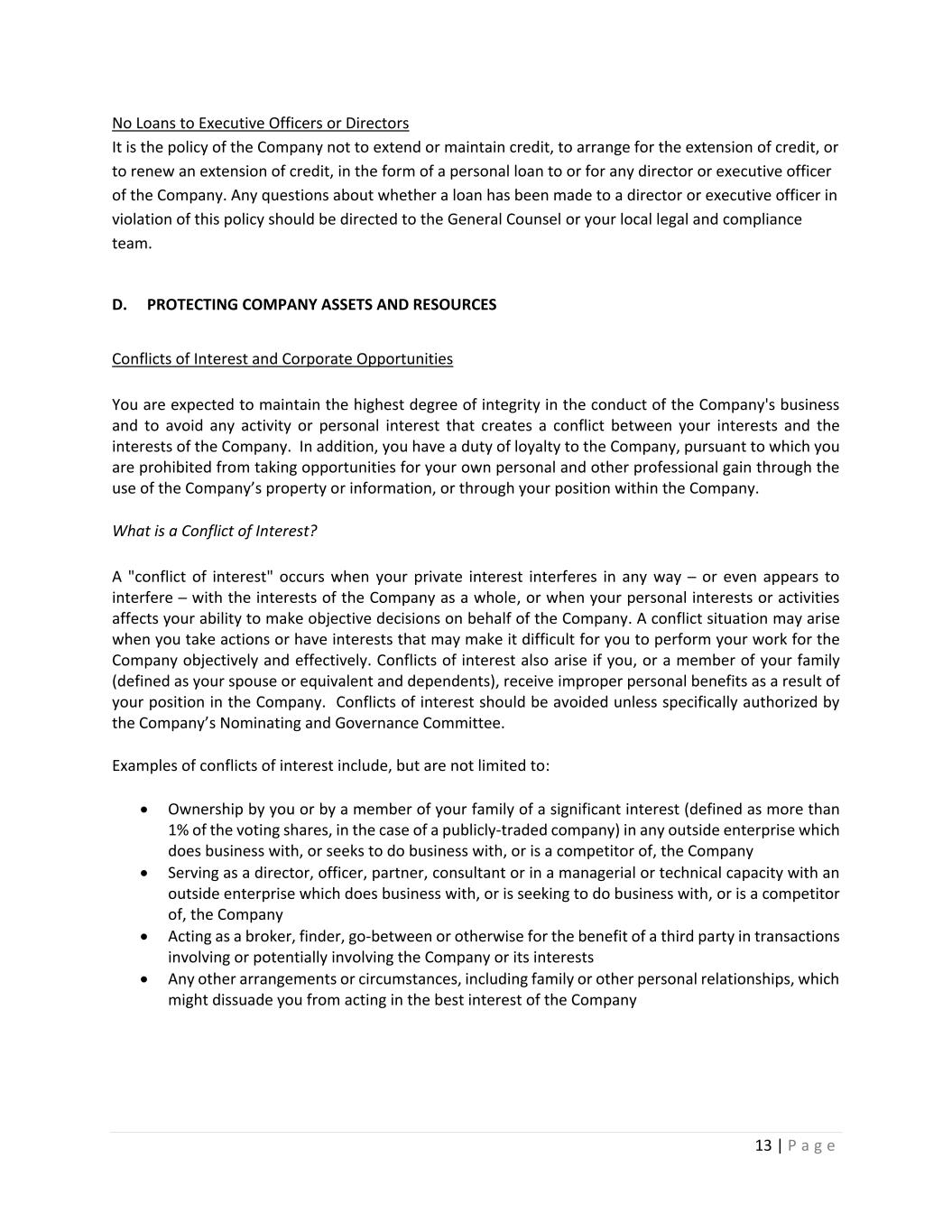
13 | P a g e No Loans to Executive Officers or Directors It is the policy of the Company not to extend or maintain credit, to arrange for the extension of credit, or to renew an extension of credit, in the form of a personal loan to or for any director or executive officer of the Company. Any questions about whether a loan has been made to a director or executive officer in violation of this policy should be directed to the General Counsel or your local legal and compliance team. D. PROTECTING COMPANY ASSETS AND RESOURCES Conflicts of Interest and Corporate Opportunities You are expected to maintain the highest degree of integrity in the conduct of the Company's business and to avoid any activity or personal interest that creates a conflict between your interests and the interests of the Company. In addition, you have a duty of loyalty to the Company, pursuant to which you are prohibited from taking opportunities for your own personal and other professional gain through the use of the Company’s property or information, or through your position within the Company. What is a Conflict of Interest? A "conflict of interest" occurs when your private interest interferes in any way ─ or even appears to interfere ─ with the interests of the Company as a whole, or when your personal interests or activities affects your ability to make objective decisions on behalf of the Company. A conflict situation may arise when you take actions or have interests that may make it difficult for you to perform your work for the Company objectively and effectively. Conflicts of interest also arise if you, or a member of your family (defined as your spouse or equivalent and dependents), receive improper personal benefits as a result of your position in the Company. Conflicts of interest should be avoided unless specifically authorized by the Company’s Nominating and Governance Committee. Examples of conflicts of interest include, but are not limited to: • Ownership by you or by a member of your family of a significant interest (defined as more than 1% of the voting shares, in the case of a publicly-traded company) in any outside enterprise which does business with, or seeks to do business with, or is a competitor of, the Company • Serving as a director, officer, partner, consultant or in a managerial or technical capacity with an outside enterprise which does business with, or is seeking to do business with, or is a competitor of, the Company • Acting as a broker, finder, go-between or otherwise for the benefit of a third party in transactions involving or potentially involving the Company or its interests • Any other arrangements or circumstances, including family or other personal relationships, which might dissuade you from acting in the best interest of the Company
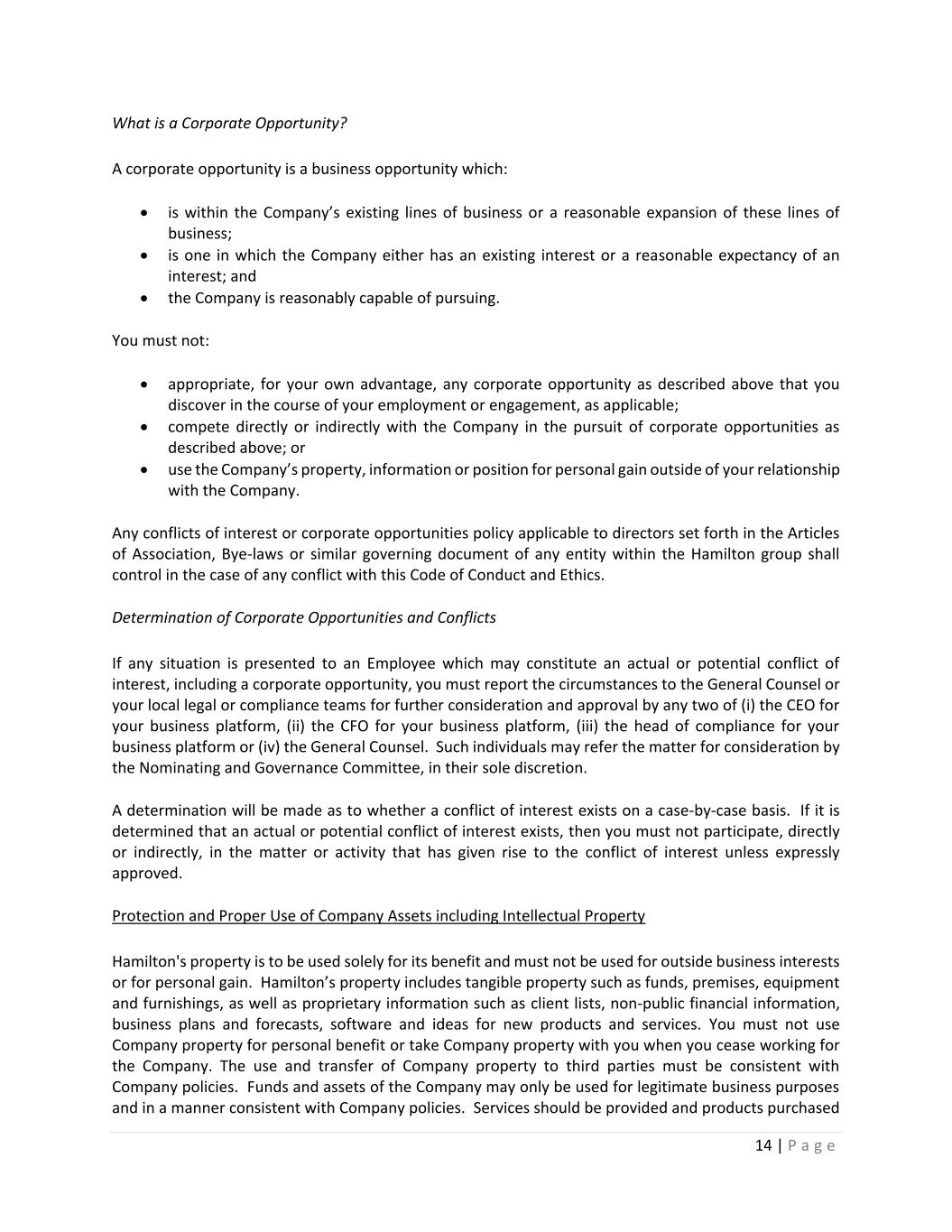
14 | P a g e What is a Corporate Opportunity? A corporate opportunity is a business opportunity which: • is within the Company’s existing lines of business or a reasonable expansion of these lines of business; • is one in which the Company either has an existing interest or a reasonable expectancy of an interest; and • the Company is reasonably capable of pursuing. You must not: • appropriate, for your own advantage, any corporate opportunity as described above that you discover in the course of your employment or engagement, as applicable; • compete directly or indirectly with the Company in the pursuit of corporate opportunities as described above; or • use the Company’s property, information or position for personal gain outside of your relationship with the Company. Any conflicts of interest or corporate opportunities policy applicable to directors set forth in the Articles of Association, Bye-laws or similar governing document of any entity within the Hamilton group shall control in the case of any conflict with this Code of Conduct and Ethics. Determination of Corporate Opportunities and Conflicts If any situation is presented to an Employee which may constitute an actual or potential conflict of interest, including a corporate opportunity, you must report the circumstances to the General Counsel or your local legal or compliance teams for further consideration and approval by any two of (i) the CEO for your business platform, (ii) the CFO for your business platform, (iii) the head of compliance for your business platform or (iv) the General Counsel. Such individuals may refer the matter for consideration by the Nominating and Governance Committee, in their sole discretion. A determination will be made as to whether a conflict of interest exists on a case-by-case basis. If it is determined that an actual or potential conflict of interest exists, then you must not participate, directly or indirectly, in the matter or activity that has given rise to the conflict of interest unless expressly approved. Protection and Proper Use of Company Assets including Intellectual Property Hamilton's property is to be used solely for its benefit and must not be used for outside business interests or for personal gain. Hamilton’s property includes tangible property such as funds, premises, equipment and furnishings, as well as proprietary information such as client lists, non-public financial information, business plans and forecasts, software and ideas for new products and services. You must not use Company property for personal benefit or take Company property with you when you cease working for the Company. The use and transfer of Company property to third parties must be consistent with Company policies. Funds and assets of the Company may only be used for legitimate business purposes and in a manner consistent with Company policies. Services should be provided and products purchased
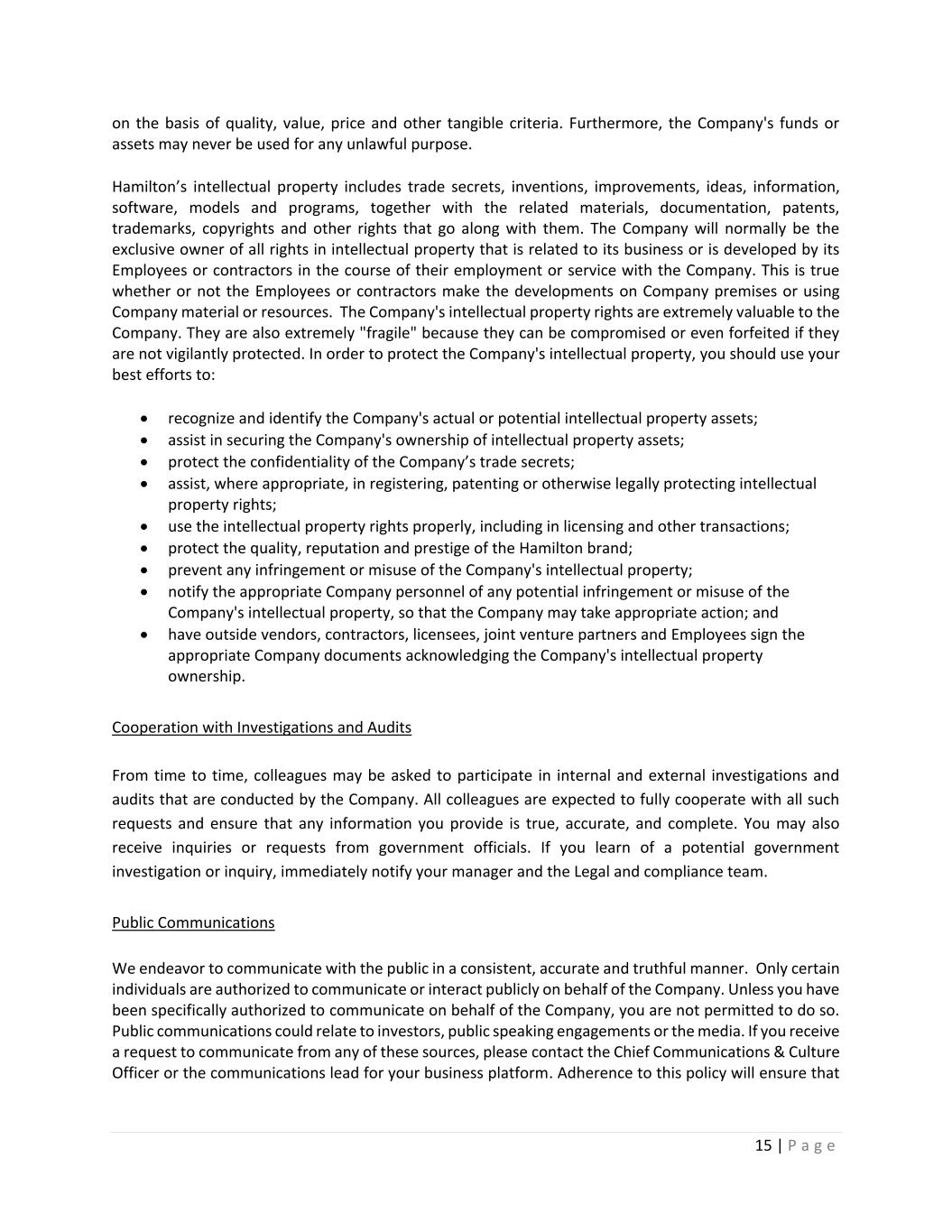
15 | P a g e on the basis of quality, value, price and other tangible criteria. Furthermore, the Company's funds or assets may never be used for any unlawful purpose. Hamilton’s intellectual property includes trade secrets, inventions, improvements, ideas, information, software, models and programs, together with the related materials, documentation, patents, trademarks, copyrights and other rights that go along with them. The Company will normally be the exclusive owner of all rights in intellectual property that is related to its business or is developed by its Employees or contractors in the course of their employment or service with the Company. This is true whether or not the Employees or contractors make the developments on Company premises or using Company material or resources. The Company's intellectual property rights are extremely valuable to the Company. They are also extremely "fragile" because they can be compromised or even forfeited if they are not vigilantly protected. In order to protect the Company's intellectual property, you should use your best efforts to: • recognize and identify the Company's actual or potential intellectual property assets; • assist in securing the Company's ownership of intellectual property assets; • protect the confidentiality of the Company’s trade secrets; • assist, where appropriate, in registering, patenting or otherwise legally protecting intellectual property rights; • use the intellectual property rights properly, including in licensing and other transactions; • protect the quality, reputation and prestige of the Hamilton brand; • prevent any infringement or misuse of the Company's intellectual property; • notify the appropriate Company personnel of any potential infringement or misuse of the Company's intellectual property, so that the Company may take appropriate action; and • have outside vendors, contractors, licensees, joint venture partners and Employees sign the appropriate Company documents acknowledging the Company's intellectual property ownership. Cooperation with Investigations and Audits From time to time, colleagues may be asked to participate in internal and external investigations and audits that are conducted by the Company. All colleagues are expected to fully cooperate with all such requests and ensure that any information you provide is true, accurate, and complete. You may also receive inquiries or requests from government officials. If you learn of a potential government investigation or inquiry, immediately notify your manager and the Legal and compliance team. Public Communications We endeavor to communicate with the public in a consistent, accurate and truthful manner. Only certain individuals are authorized to communicate or interact publicly on behalf of the Company. Unless you have been specifically authorized to communicate on behalf of the Company, you are not permitted to do so. Public communications could relate to investors, public speaking engagements or the media. If you receive a request to communicate from any of these sources, please contact the Chief Communications & Culture Officer or the communications lead for your business platform. Adherence to this policy will ensure that
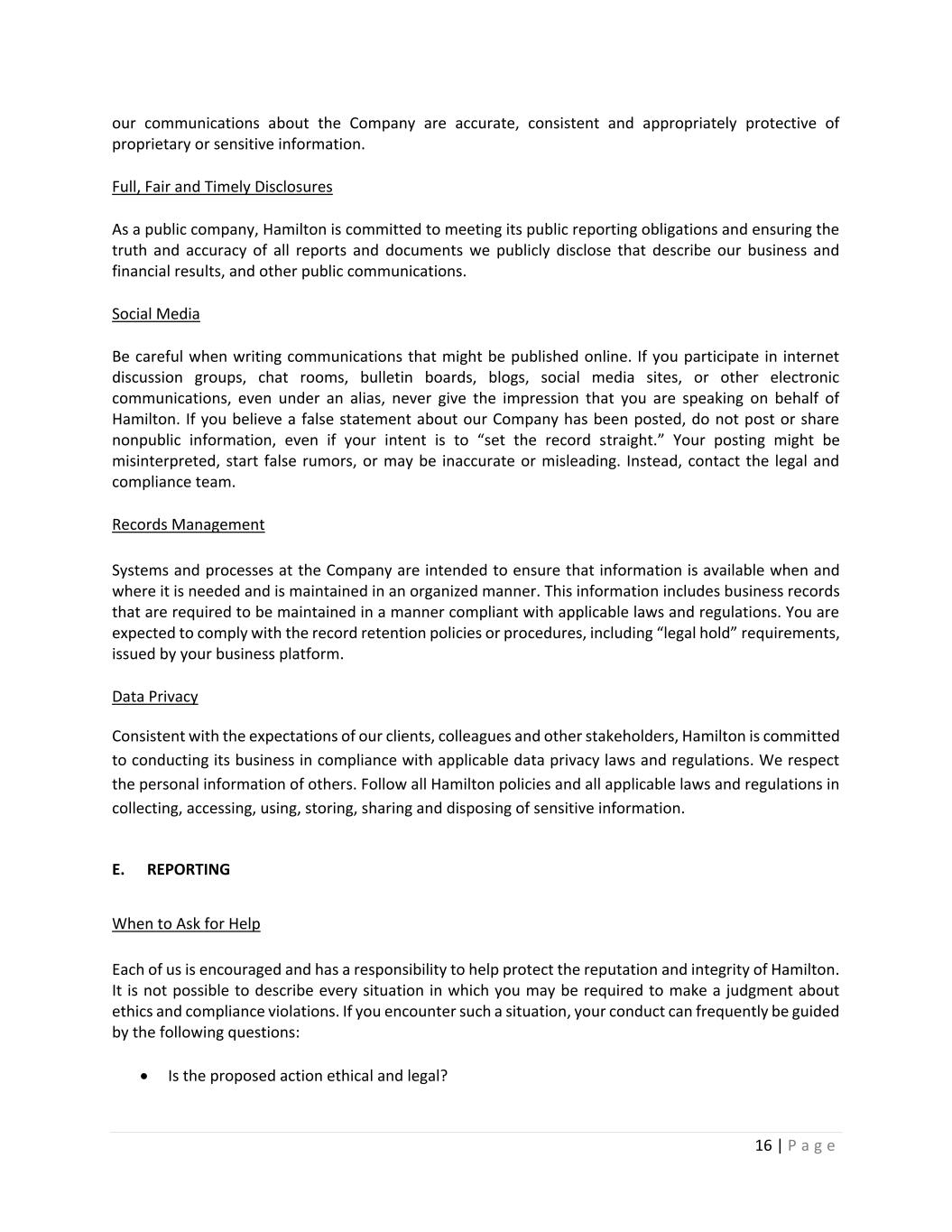
16 | P a g e our communications about the Company are accurate, consistent and appropriately protective of proprietary or sensitive information. Full, Fair and Timely Disclosures As a public company, Hamilton is committed to meeting its public reporting obligations and ensuring the truth and accuracy of all reports and documents we publicly disclose that describe our business and financial results, and other public communications. Social Media Be careful when writing communications that might be published online. If you participate in internet discussion groups, chat rooms, bulletin boards, blogs, social media sites, or other electronic communications, even under an alias, never give the impression that you are speaking on behalf of Hamilton. If you believe a false statement about our Company has been posted, do not post or share nonpublic information, even if your intent is to “set the record straight.” Your posting might be misinterpreted, start false rumors, or may be inaccurate or misleading. Instead, contact the legal and compliance team. Records Management Systems and processes at the Company are intended to ensure that information is available when and where it is needed and is maintained in an organized manner. This information includes business records that are required to be maintained in a manner compliant with applicable laws and regulations. You are expected to comply with the record retention policies or procedures, including “legal hold” requirements, issued by your business platform. Data Privacy Consistent with the expectations of our clients, colleagues and other stakeholders, Hamilton is committed to conducting its business in compliance with applicable data privacy laws and regulations. We respect the personal information of others. Follow all Hamilton policies and all applicable laws and regulations in collecting, accessing, using, storing, sharing and disposing of sensitive information. E. REPORTING When to Ask for Help Each of us is encouraged and has a responsibility to help protect the reputation and integrity of Hamilton. It is not possible to describe every situation in which you may be required to make a judgment about ethics and compliance violations. If you encounter such a situation, your conduct can frequently be guided by the following questions: • Is the proposed action ethical and legal?
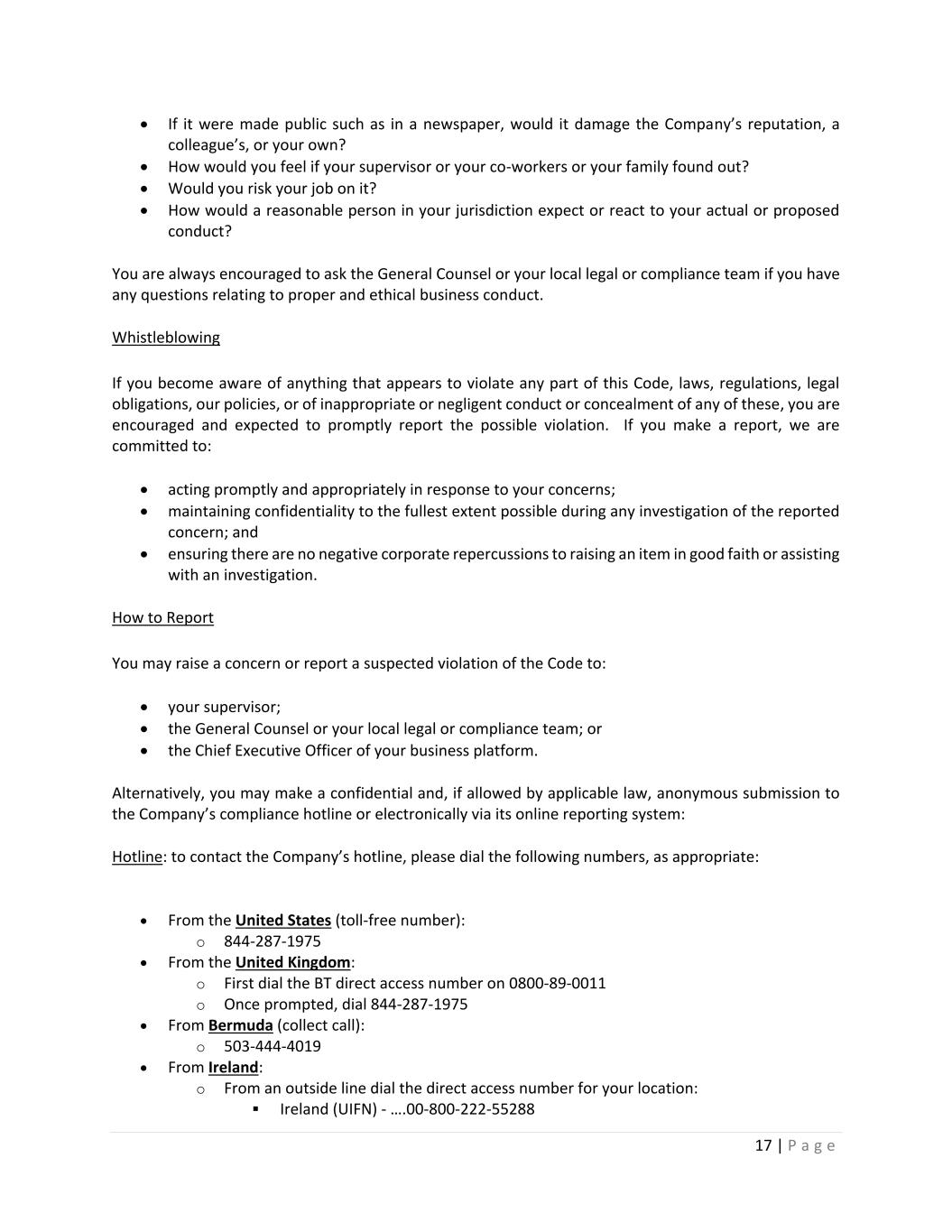
17 | P a g e • If it were made public such as in a newspaper, would it damage the Company’s reputation, a colleague’s, or your own? • How would you feel if your supervisor or your co-workers or your family found out? • Would you risk your job on it? • How would a reasonable person in your jurisdiction expect or react to your actual or proposed conduct? You are always encouraged to ask the General Counsel or your local legal or compliance team if you have any questions relating to proper and ethical business conduct. Whistleblowing If you become aware of anything that appears to violate any part of this Code, laws, regulations, legal obligations, our policies, or of inappropriate or negligent conduct or concealment of any of these, you are encouraged and expected to promptly report the possible violation. If you make a report, we are committed to: • acting promptly and appropriately in response to your concerns; • maintaining confidentiality to the fullest extent possible during any investigation of the reported concern; and • ensuring there are no negative corporate repercussions to raising an item in good faith or assisting with an investigation. How to Report You may raise a concern or report a suspected violation of the Code to: • your supervisor; • the General Counsel or your local legal or compliance team; or • the Chief Executive Officer of your business platform. Alternatively, you may make a confidential and, if allowed by applicable law, anonymous submission to the Company’s compliance hotline or electronically via its online reporting system: Hotline: to contact the Company’s hotline, please dial the following numbers, as appropriate: o 503-444-4019 • From the United States (toll-free number): o 844-287-1975 • From the United Kingdom: o First dial the BT direct access number on 0800-89-0011 o Once prompted, dial 844-287-1975 • From Bermuda (collect call): o 503-444-4019 • From Ireland: o From an outside line dial the direct access number for your location: ▪ Ireland (UIFN) - ….00-800-222-55288
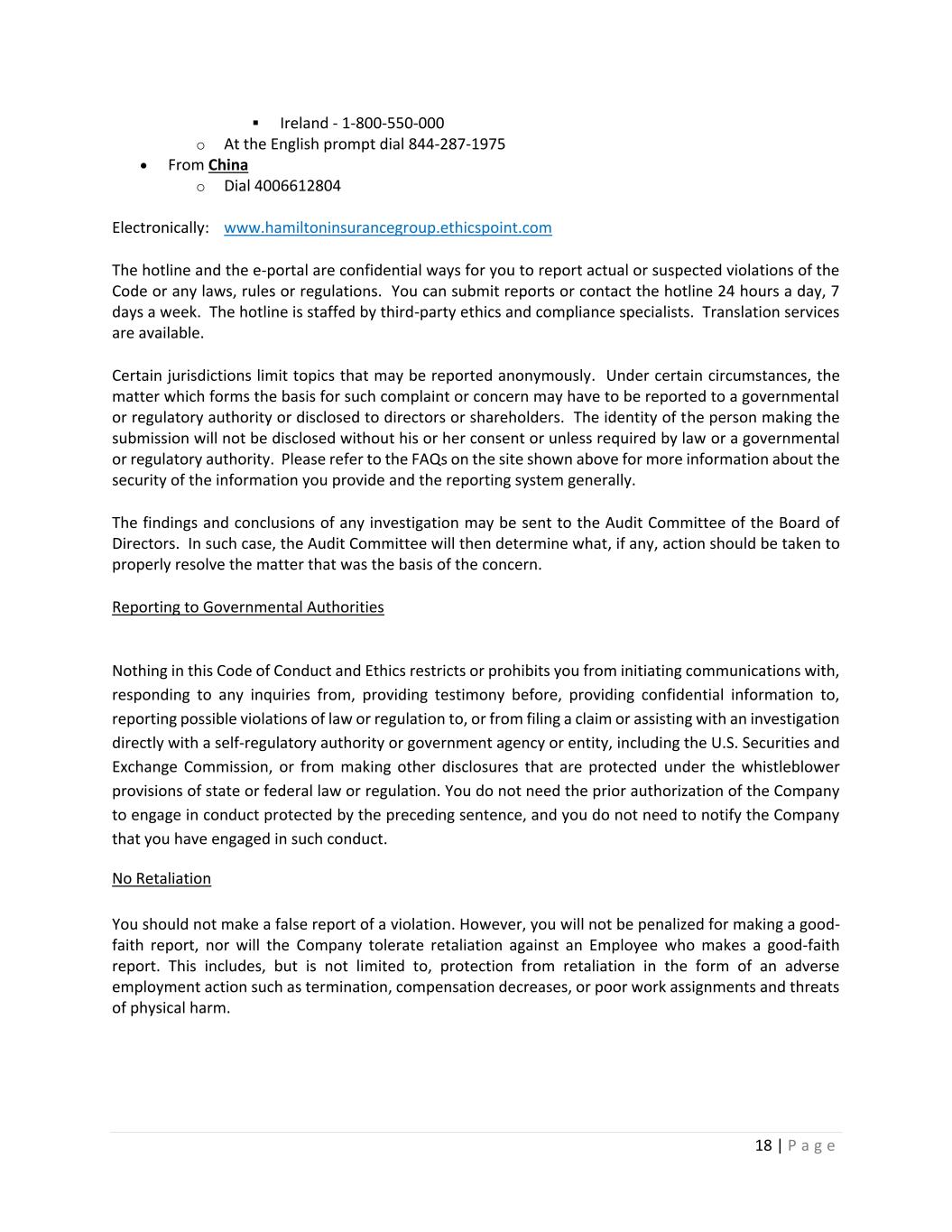
18 | P a g e ▪ Ireland - 1-800-550-000 o At the English prompt dial 844-287-1975 • From China o Dial 4006612804 Electronically: www.hamiltoninsurancegroup.ethicspoint.com The hotline and the e-portal are confidential ways for you to report actual or suspected violations of the Code or any laws, rules or regulations. You can submit reports or contact the hotline 24 hours a day, 7 days a week. The hotline is staffed by third-party ethics and compliance specialists. Translation services are available. Certain jurisdictions limit topics that may be reported anonymously. Under certain circumstances, the matter which forms the basis for such complaint or concern may have to be reported to a governmental or regulatory authority or disclosed to directors or shareholders. The identity of the person making the submission will not be disclosed without his or her consent or unless required by law or a governmental or regulatory authority. Please refer to the FAQs on the site shown above for more information about the security of the information you provide and the reporting system generally. The findings and conclusions of any investigation may be sent to the Audit Committee of the Board of Directors. In such case, the Audit Committee will then determine what, if any, action should be taken to properly resolve the matter that was the basis of the concern. Reporting to Governmental Authorities Nothing in this Code of Conduct and Ethics restricts or prohibits you from initiating communications with, responding to any inquiries from, providing testimony before, providing confidential information to, reporting possible violations of law or regulation to, or from filing a claim or assisting with an investigation directly with a self-regulatory authority or government agency or entity, including the U.S. Securities and Exchange Commission, or from making other disclosures that are protected under the whistleblower provisions of state or federal law or regulation. You do not need the prior authorization of the Company to engage in conduct protected by the preceding sentence, and you do not need to notify the Company that you have engaged in such conduct. No Retaliation You should not make a false report of a violation. However, you will not be penalized for making a good- faith report, nor will the Company tolerate retaliation against an Employee who makes a good-faith report. This includes, but is not limited to, protection from retaliation in the form of an adverse employment action such as termination, compensation decreases, or poor work assignments and threats of physical harm.
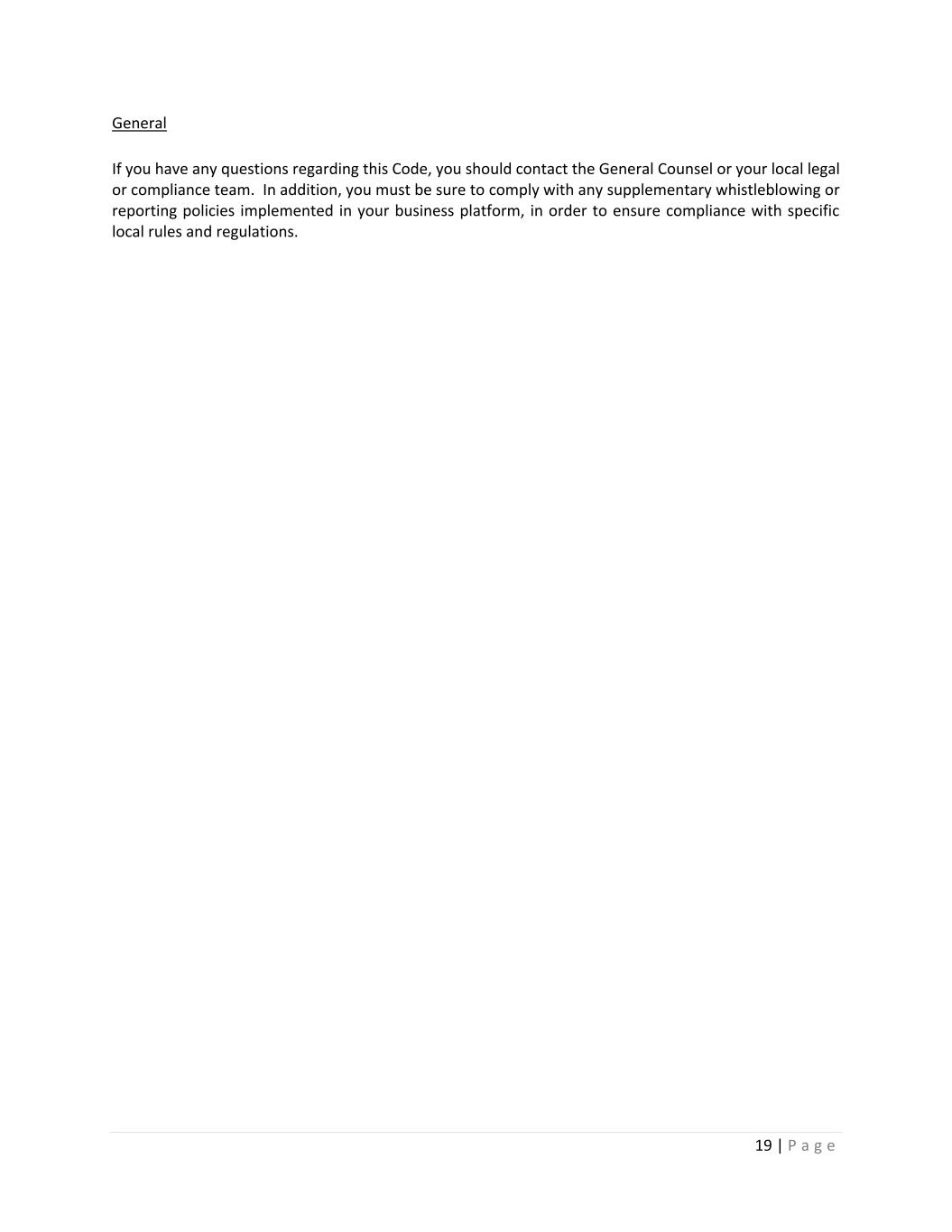
19 | P a g e General If you have any questions regarding this Code, you should contact the General Counsel or your local legal or compliance team. In addition, you must be sure to comply with any supplementary whistleblowing or reporting policies implemented in your business platform, in order to ensure compliance with specific local rules and regulations.
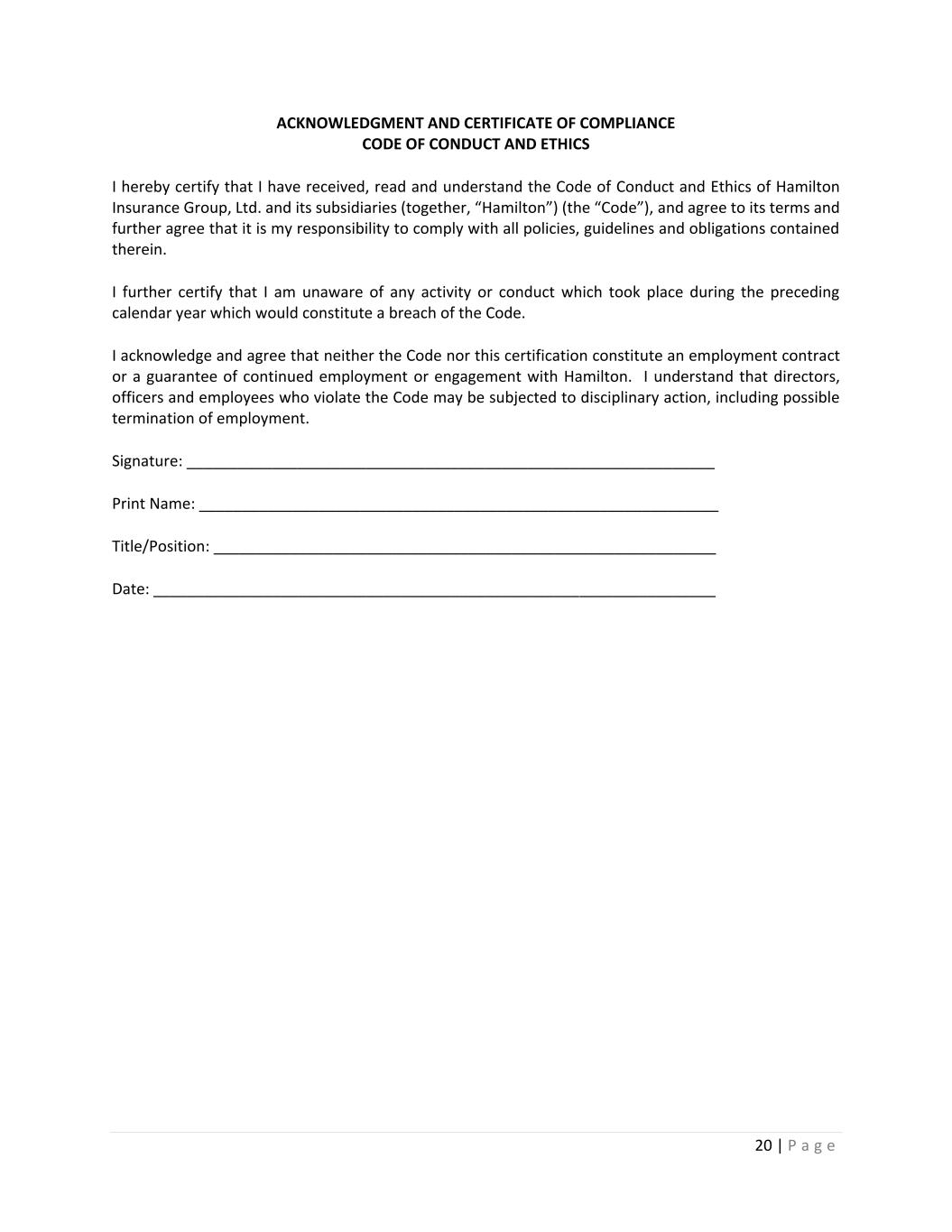
20 | P a g e ACKNOWLEDGMENT AND CERTIFICATE OF COMPLIANCE CODE OF CONDUCT AND ETHICS I hereby certify that I have received, read and understand the Code of Conduct and Ethics of Hamilton Insurance Group, Ltd. and its subsidiaries (together, “Hamilton”) (the “Code”), and agree to its terms and further agree that it is my responsibility to comply with all policies, guidelines and obligations contained therein. I further certify that I am unaware of any activity or conduct which took place during the preceding calendar year which would constitute a breach of the Code. I acknowledge and agree that neither the Code nor this certification constitute an employment contract or a guarantee of continued employment or engagement with Hamilton. I understand that directors, officers and employees who violate the Code may be subjected to disciplinary action, including possible termination of employment. Signature: ______________________________________________________________ Print Name: _____________________________________________________________ Title/Position: ___________________________________________________________ Date: __________________________________________________________________




















